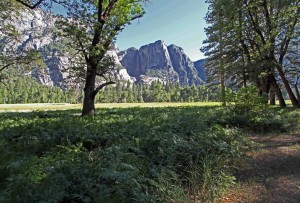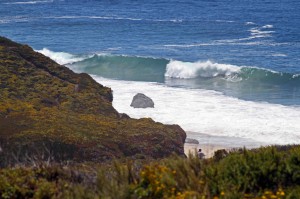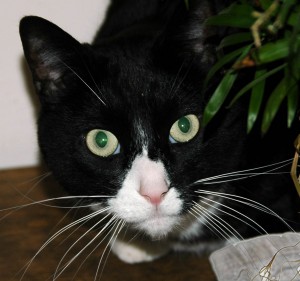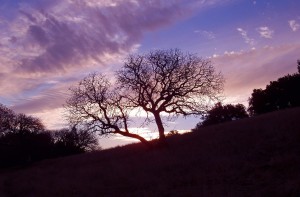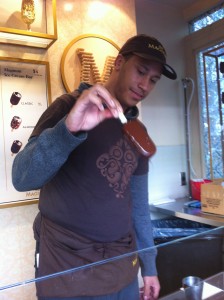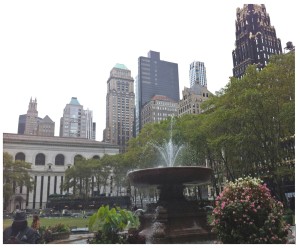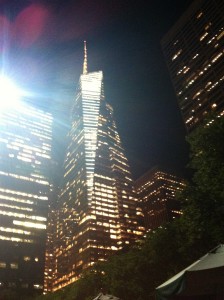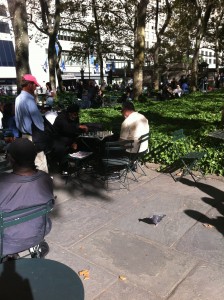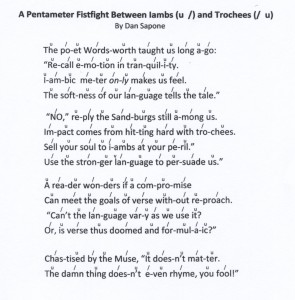Archive for Poetry
Did A Human Write This?
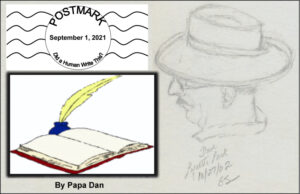
Last Fall
New York Times Columnist Farhad Manjoo
wrote a piece called:
Did a Human Write This?
Well?
Click here for a PDF of this post: Did_A_Human_Write_This_SEPT1_FINAL
= = = = = = = = = = = = = = = = = = = = = = = = = = = = = = = = = = = = = = = =
In the Fall of 2020, a columnist named Farhad Manjoo reported in The New York Times something that many of us have come to realize — that machines have been gaining in their ability to write for a long time now; and, he says, “they are getting terrifyingly good at it.” Many people and businesses have greeted this news with appreciation, for it can enhance our ability to do our work in many useful ways. So, why does Mr. Manjoo use the phrase “terrifyingly good” to describe this phenomenon? … (pause here a moment for internal reflection) … In another sentence, he nudges a bit closer to our real, human, concern — “I’ve never really worried that a computer might take my job because it’s never seemed remotely possible.” However, he goes on to introduce us to a relatively new piece of software, a “language model” called GPT-3 that seems to contradict this reassuring sentence. Apparently, you can “program” this software language model by providing a writing sample. It claims to be able to match the pattern and “learn to write” in the same style as a human writer would.
Hmmmmmmmmmmmm …
So, the subject of Mr. Manjoo’s piece, “Did A Human Write This?”, is intriguing in itself;
BUT here, in THIS piece of writing, I am asking a question that intrigues me much more:
–> “How Can You Tell?” <—
In other words, if we claim that we can tell that a human and not a computer wrote something, what is it about the writing that would enable us to make that distinction?
Let’s explore this question.
Human Attributes: “The Usual”
Over centuries, humans have identified a set of attributes that we claim for ourselves as distinctly human. Some of these capabilities are fundamentally cognitive, like these two:
• The ability to recognize and remember a set of sequential stimuli and complex patterns
• A high-level ability to generate and comprehend complex language.
Computer programmers and software developers attest that computers can certainly do these two things in ways that sufficiently imitate human performance. Even if that’s true, I don’t think these are the determining factors in recognizing a human source for a piece of writing.
There are other recognized human attributes that are much more closely associated with what we think of as our “humanity,” like these two examples:
• empathy — the ability to understand and share the feelings of others
• the ability to recognize and apply patterns of moral and ethical decision-making.
So, I ask: can these two examples of “humanistic” attributes be simulated or credibly imitated — heck, independently performed — by computer systems in ways that we would recognize? Can the resulting writings sound human? The makers of modern “language models” claim that they can. You and I might claim that we can tell whether attempts are genuinely human or computer-generated imitations. BUT, that would just lead to an argument between us and software engineers; and we might not win that argument. Once again, I don’t whether those are the determining factors either. So, let’s set that aside for a moment. So, let’s go back to Mr. Manjoo’s question in the New York Times: if computers could possess those abilities, does that mean that computers can take jobs being done today by our human writers? Can computers make human writers obsolete? I’ll give you my answer.
My Answer: I’m saying “No”
There are formulations I have seen in the work of human writers over centuries (and in my own writing) that demonstrate distinctly human patterns of thought. I insist that these patterns are evidence of our human-ness that we can all recognize in our own behavior, and in the behavior of others, as distinctly human. They are NOT, I insist, patterns that computers would generate on their own. Even if they could, after looking at some examples, one can’t help but ask, “Why would a computer want to intentionally imitate these human patterns of thought and expression? (It’s not an unreasonable question to ask why humans would want to exhibit these patterns, but we can leave that for another time.) What are they? Let’s examine three examples of traits that human writers have attributed to their human characters, both in fiction and nonfiction:
• The propensity for lapses in memory, and patterns of incongruity
• The potential of individuals to hold opposing and contradictory views simultaneously
• The habit of some individuals to act in ways that are contrary to their own best interests.
Well, now maybe we’re getting closer to answering our question. These are human behaviors that appear repeatedly in writing about human characters. I am not convinced that writing generated entirely by computer software would or could feature these behaviors unless guided by an interfering human. On further reflection, even if they could, I don’t think these are the most important features that could answer the question: can computers make human writers obsolete?
Below are what I claim are the three principal indictors that matter: human attributes that writers portray in their characters that exhibit the most common elements of our humanity. Without these examples (and I’m sure there are others), much of our literature would be deficient:
• Digression, also known as ‘stream of consciousness’ thinking
• Silliness
• Illogic
Perhaps there are other examples, but let’s look at these three.
The Three Human Indicators: What do we see in Human Storytelling?
ONE: Digression: A lot of great American literature is built, at least in part, by this feature.
“… but as I was saying when … “ or “let’s set that aside for a moment”
Literature is full of examples of “stream of consciousness” storytelling in which the “voice” of the story speaks to the reader directly and digresses from the telling to share seemingly random thoughts along the way — Jack London (“To Build a Fire”), Ambrose Bierce (“Occurrence at Owl Creek Bridge”), Edgar Allen Poe (“The Tell-Tale Heart”), Mark Twain (“Speech On The Weather” and many others), Kate Chopin (“The Night Came Slowly”), are impressive examples.
It is interesting to me that some of the best examples of digression are not just found in stories, but also poems. In one of my favorite pieces of distinctly human literature, Robert Frost uses digression to capture an important element of imaginative reminiscence. In his poem “Birches,” Frost imagines a boy bending the branches of his father’s birch trees. He retells an entire childhood scenario of the boy climbing the trees in a particularly stylish way while doing his chores — “as he went out and in to fetch the cows.” A boy’s entire world view is shaped by this imaginary process. BUT then we discover that it’s all a digression. We hear that the speaker in the poem IS this boy, and then, as the poem brings us back to reality, it turns out that the ice storm is what bends the branches into their particular shape; but he would rather imagine something else:
But I was going to say when Truth broke in
With all her matter-of-fact about the ice-storm
I should prefer to have some boy bend them
As he went out and in to fetch the cows—
For Robert Frost, in his own recollection … or maybe in his imagination … he IS that boy:
So was I once myself a swinger of birches.
And so I dream of going back to be.
It’s when I’m weary of considerations,
He goes on to describe what it means to be “weary of considerations.” His imagination allows him to escape “considerations,” “rise toward heaven,” but return to earth because:
Earth’s the right place for love:
I don’t know where it’s likely to go better.
So, reality wins out over imagination … but … he concedes that the life of his imagination is not a bad place to visit:
One could do worse than be a swinger of birches.
But … I digress (you knew that was coming, eh?)
To return to Mr. Manjoo’s question — No, a computer could not have used such a digression from reality to imagination and then back again to reality to convey important messages about being human. Only a human could do that.
Below is the full text of Frost’s poem (you were hoping for that, eh?) It’s chock full of examples that confirm that no computer program imaginable could tell a story that takes you inside the human mind and heart the way these words do.
Birches, By Robert Frost
When I see birches bend to left and right
Across the lines of straighter darker trees,
I like to think some boy’s been swinging them.
But swinging doesn’t bend them down to stay
As ice-storms do. Often you must have seen them
Loaded with ice a sunny winter morning
After a rain. They click upon themselves
As the breeze rises, and turn many-colored
As the stir cracks and crazes their enamel.
Soon the sun’s warmth makes them shed crystal shells
Shattering and avalanching on the snow-crust—
Such heaps of broken glass to sweep away
You’d think the inner dome of heaven had fallen.
They are dragged to the withered bracken by the load,
And they seem not to break; though once they are bowed
So low for long, they never right themselves:
You may see their trunks arching in the woods
Years afterwards, trailing their leaves on the ground
Like girls on hands and knees that throw their hair
Before them over their heads to dry in the sun.
But I was going to say when Truth broke in
With all her matter-of-fact about the ice-storm
I should prefer to have some boy bend them
As he went out and in to fetch the cows—
Some boy too far from town to learn baseball,
Whose only play was what he found himself,
Summer or winter, and could play alone.
One by one he subdued his father’s trees
By riding them down over and over again
Until he took the stiffness out of them,
And not one but hung limp, not one was left
For him to conquer. He learned all there was
To learn about not launching out too soon
And so not carrying the tree away
Clear to the ground. He always kept his poise
To the top branches, climbing carefully
With the same pains you use to fill a cup
Up to the brim, and even above the brim.
Then he flung outward, feet first, with a swish,
Kicking his way down through the air to the ground.
So was I once myself a swinger of birches.
And so I dream of going back to be.
It’s when I’m weary of considerations,
And life is too much like a pathless wood
Where your face burns and tickles with the cobwebs
Broken across it, and one eye is weeping
From a twig’s having lashed across it open.
I’d like to get away from earth awhile
And then come back to it and begin over.
May no fate willfully misunderstand me
And half grant what I wish and snatch me away
Not to return. Earth’s the right place for love:
I don’t know where it’s likely to go better.
I’d like to go by climbing a birch tree,
And climb black branches up a snow-white trunk
Toward heaven, till the tree could bear no more,
But dipped its top and set me down again.
That would be good both going and coming back.
One could do worse than be a swinger of birches.
TWO: Silliness
Illustrating another distinctly human attribute — here is a childhood ditty that got translated into something that endured for more than a century:
Mares eat oats and does eat oats and little lambs eat ivy
A kidd’l eat ivy too, wouldn’t you?
That ended up being translated by generations of kids into this human silliness:
Marsey-dotes and dosey-dotes, and little lambsey-divey
A kidd’ldey-divey-doo, wouldn’t you?
Literature throughout western civilization is full of enduring uses of silliness to demonstrate a host of human values and truths. Monty Python is a modern example. We can go back a bit farther to Don Quixote by Cervantes and some of the writings of Roald Dahl with his “vocabulary of made-up words.” Even the ancient Greeks made use of silliness to make people giggle many centuries ago. For more — take a look into a book by art critic Peter Timms Silliness, A Serious History, which looked at the ways we’ve been made to laugh in pursuit of serious themes through our literary history.
These examples affirm the assertion that a computer is not capable of using our innate human silliness to write something that is purely fun and ridiculous without resorting to some bit of logical sense. Only humans are sufficiently silly to reveal that aspect of our human selves.
THREE: Illogic: Spock’s breakthrough
The masterful writing of Gene Roddenberry in the TV series Star Trek, repeatedly illustrated the effect of combining human (i.e., Earthling) and nonhuman (i.e., Vulcan) attributes. In the episode “The Galileo Seven (co-written by Oliver Crawford),” Lt. Commander Spock illustrates, as always, the contrast between his Vulcan dependence on logic as the overriding guiding principle of all of his decisions and the more “human” decision-making typical of Captain Kirk, which sometimes utilized emotion and impulsive reliance on intuition.
In this story, Spock is commander of a landing spacecraft whose small crew launched from The USS Enterprise to land on a small planet and solve a life-threatening problem. When the expedition went awry and trapped Spock on the planet’s surface, the crew risked the safety of their ship to save Spock’s life. He had ordered them to take off without him to save the ship and crew (a logical order); but they disobeyed his order by applying their human compassion, risked their own lives, and went back to the planet to save him. Although he reprimanded them for their illogical decision, what followed was a decision he had to make to save them all from certain destruction.
For technical reasons, the Starship Enterprise was unable to locate the Galileo to beam them back to the ship. With fuel running out, the Galileo and all on board, appear to be doomed to fall and burn up in the planet’s atmosphere. Spock’s response was, for him, illogical — he launched and ignited the remaining fuel tank — ending their control of the ship — effectively sending up a flare. The slim hope was that the Enterprise, heading in a different direction, would see it and determine their location well enough to beam them aboard and save them all.
MCCOY: It may be the last action you’ll ever take, Mr. Spock, but it was all human.
SPOCK: Totally illogical. There was no chance.
MCCOY: That’s exactly what I mean.
At the last moment, as the ship begins to burn up, transporter beams lock onto the crew members and transport them safely onboard the Enterprise.
Back on duty, a bemused Captain Kirk questions Spock about his last-minute command decision:
KIRK: There’s really something I don’t understand about all of this. Maybe you can explain it to me. Logically, of course. When you jettisoned the fuel and ignited it, you knew there was virtually no chance of it being seen, yet you did it anyhow. That would seem to me to be an act of desperation.
SPOCK: Quite correct, Captain.
KIRK: Now we all know, and I’m sure the doctor will agree with me, that desperation is a highly emotional state of mind. How does your well-known logic explain that?
SPOCK: Quite simply, Captain. I examined the problem from all angles, and it was plainly hopeless. Logic informed me that under the circumstances, the only possible action would have to be one of desperation. Logical decision, logically arrived at.
KIRK: I see. You mean you reasoned that it was time for an emotional outburst.
SPOCK: Well, I wouldn’t put it in exactly those terms, Captain, but those are essentially the facts.
KIRK: You’re not going to admit that for the first time in your life, you committed a purely human emotional act?
SPOCK: No, sir.
KIRK: Mr. Spock, you’re a stubborn man.
SPOCK: Yes, sir.
Illogic is such an intrinsic feature of human behavior and understanding that only a human writer would be capable of expressing is convincingly. It is one of the clear qualities of human writing that cannot be successfully imitated by a computer. We humans recognize it when we see it.
So, no, the jobs of human writers are not in danger of being overtaken by computers. End of discussion. So says the human writer.
![]()
Reflections On Change — It’s Fall, Right?
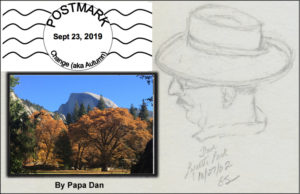
“One cannot make the words too strong.”
— Mark Twain
Click here to download a PDF of this post: Its_Fall_Change
It’s Autumn (aka Fall)
This year, Autumn begins on Monday, September 23 and ends on Saturday, December 21, here in the Northern Hemisphere. During this season, daylight hours become noticeably shorter and the temperature cools considerably. It is also the time when crops and fruits become ready for harvest. In English jargon, over time it has come to be known as The Fall because most leaves fall to the ground and change the color and texture of the landscape dramatically. As a result, all of this change provides great beauty to see in the Fall; and each region has its own style.
Vermont through a windshield—Fall 2013
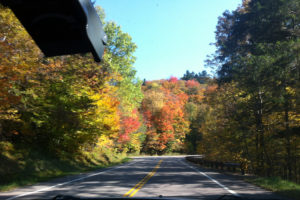 Now, some people will tell you that you must travel to New England to see “Real Fall Colors.” OK, Gretta and I did that in the Fall of 2013 just to see the colors and — OK — they do know how to do colors in the northeast when Summer turns to Fall. Vermont, New Hampshire, Connecticut, even Maine, did strut some colorful stuff. BUT, while that experience was spectacular, I’m here to tell you (among other things) that you don’t have to travel to the Northeast to see “Real Fall Colors.” Let’s not forget that we live in California.
Now, some people will tell you that you must travel to New England to see “Real Fall Colors.” OK, Gretta and I did that in the Fall of 2013 just to see the colors and — OK — they do know how to do colors in the northeast when Summer turns to Fall. Vermont, New Hampshire, Connecticut, even Maine, did strut some colorful stuff. BUT, while that experience was spectacular, I’m here to tell you (among other things) that you don’t have to travel to the Northeast to see “Real Fall Colors.” Let’s not forget that we live in California.
So, whadda We got?:
— In southern California, the most notorious source of “Fall colors” is the Black Oak, which turns its leaves to a nice golden yellow.
— In northern California, right here in the Bay Area, big-leaf Maple trees are famous for showing off their gigantic deeply reddened leaves before they fall to the ground.
— Farther north in Humboldt County, we see Oregon Ash, Dogwood, Red Alder, White Alder, Cottonwood, and (watch out!) Poison Oak. Each of these is spectacular and, when you can see them all at once … Whoa! … there are no words …
— In Shasta County, especially around Burney Falls, you can see ALL of those plus Vine Maple, Buck Brush, Deer Brush, Red Flowering Currant, and Squaw Bush — all turning from various shades of green to a profusion of reddish, orangish, yellowish, and brownish hues.
— AND THEN there’s the wine country(ies) throughout California, … as the grapes sweeten for harvest and prepare themselves to become the best wine in the world, the vines and ground cover can fill your eyes with multiple shades of greens and reds and even blues and yellows … well … OK, so you’re going to tell me that it doesn’t make sense to try to describe the dramatic changes that happen in the Fall with words, and you’ll be right. AND THEN, you’ll tell me that showing just one picture, or even two, as examples of this phenomenon will fall miserably short of the task. Below — First: Fall Colors in a California Vineyard — Second: And Up Close.
But, well, you gotta look at some colors before we talk about this subject some more.
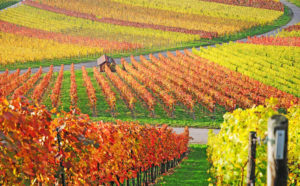

So, before we continue, you may ask, what exactly is the subject? Is it really about the colors? Or is it about the only constant we can be sure of in this world — change.
Change Is Gonna Come — Oh, Yes It Will
Of course, all of these magnificent colors appear and the leaves fall to the ground because they are dying. Dying. You know, the living things that grow out of the Earth bud and blossom in the spring, they live their lives all summer, and then they die in the Fall. They must die because the trees and vines must shed their growth, spend the Winter in a comatose state — also known as hibernation, suspended animation, … uh … you know, “death” — so they can be reborn and come back to life in the Spring. But, we have to rake up the dead leaves first — And make no mistake, they are dead. Those are the rules.
It’s about change. It’s about change that must happen. But you knew that …
So, We Look to the Poets
Our poets go out of their way to move us past the obvious and convey to us more than the appearance of stunning changes like those we experience in the Fall; they are inspired by the cool fresh air and the end of oppressive inland heat; they celebrate the wonderful produce of all of that struggle (especially in wine country); AND, they also spend some effort marveling at the “terrible beauty” of the cycle itself — birth to life, life to achievement, achievement to beauty, beauty to death, and death to rebirth. Each of these steps must follow from the steps before them. So, often, poets are trying to reveal how all of this inevitable change feels for us humans and what expectations those feelings generate. So, how do we humans experience change?
Let’s ask some of our poets about change, through eyes that view the colors of the season:
- In this one, a young Shakespeare seems to focus on the sense of loss that Fall brings.
That time of year thou mayst in me behold — Sonnet #73 by William Shakespeare
That time of year thou mayst in me behold
When yellow leaves, or none, or few, do hang
Upon those boughs which shake against the cold,
Bare ruined choirs, where late the sweet birds sang.
In me thou see’st the twilight of such day
As after sunset fadeth in the west;
Which by and by black night doth take away,
Death’s second self, that seals up all in rest.
In me thou see’st the glowing of such fire,
That on the ashes of his youth doth lie,
As the death-bed, whereon it must expire,
Consumed with that which it was nourish’d by.
This thou perceiv’st, which makes thy love more strong,
To love that well, which thou must leave ere long.
- Next, Robert Frost appreciates the colors of the season, but laments the loss that follows.
Nothing Gold Can Stay by Robert Frost
Nature’s first green is gold,
Her hardest hue to hold.
Her early leaf’s a flower;
But only so an hour.
Then leaf subsides to leaf.
So Eden sank to grief,
So dawn goes down to day.
Nothing gold can stay.
- In her book Time and Place, local poet Lauren de Vore reflects on the responsibility for introspection that comes with the expectation of change. In the chapter on Autumn, her sonnet Taking Stock identifies the change of Autumn as something much more than colors.
Taking Stock by Lauren de Vore
October is my time to introspect,
As like a gleaner following the scythe
I cull through recollection’s field and, eyes
Attuned to see, unflinchingly reflect.
It’s easy to tot up the obvious,
That never-ending list of tasks that should
Be done before the rains arrive and would
Were I, in this, not kin to Sisyphus
Th’intangibles are harder to appraise;
Did I come through for those who needed me?
Did kindness guide my words and honesty
My acts, or did I tread a selfish maze?
One must at times take candid look within
In striving for a life that’s genuine.
- Frank DeRose comes right out and tells us that Autumn is gonna bring important change that will matter very much to us humans, well beyond the colors we see around us.
To Change Autumn is the Season by Frank DeRose
Colors turn,
Leaves fall.
For everything there is a time.
Autumn is a time for change,
A time for being human,
A time to reflect
(On warm summer nights),
And a time to anticipate
(Fiery winter days).
We are human.
Ever-changing,
Ever-moving,
Endlessly.
We are autumnal beings.
Yellow with happiness,
Orange with warmth,
And red with anger.
Red with love.
Red with hatred.
We are as cool
As the crisp breeze,
And as warm
As the colors around us.
To everything there is a season,
For everything there is a time.
A time to lie complacent,
And a time for change.
Autumn is the time for change.
- And our dear old friend Mark Twain brings this Autumnal experience to a close by showing us, entirely with his words, the natural climax of the change at the end of Autumn — words that convey this miracle in ways that a photograph could never do. He shows us the New England ice storm that brings the Fall to its dramatic conclusion. In front of an audience one day, Mr. Twain, rambled on like this (it is my favorite paragraph in all American literature):
— If we hadn’t our bewitching autumn foliage, we should still have to credit the weather with one feature which compensates for all its bullying vagaries — the ice-storm: when a leafless tree is clothed with ice from bottom to top — ice that is as bright and clear as crystal; when every bough and twig is strung with ice-beads, frozen dew-drops, and the whole tree sparkles cold and white, like the Shah of Persia’s diamond plume. Then the wind waves the branches and the sun comes out and turns all those myriads of beads and drops to prisms that glow and burn and flash with all manner of colored fires, which change and change again with inconceivable rapidity from blue to red, from red to green, and green to gold — the tree becomes a spraying fountain, a very explosion of dazzling jewels; and it stands there the acme, the climax, the supremest possibility in art or nature, of bewildering, intoxicating, intolerable magnificence.
One cannot make the words too strong. — Mark Twain
So much for the changes that Fall brings. Along with all of these features, the coming of Fall can remind us humans, at least subconsciously, of the other kinds of change we come to expect — if we are optimists — or the kinds of change that we want to see, that we hope for, that we desperately need to see, that we may fear are out of our reach, as we look around at the disappointing world of the time in which we live.
- Among our poets, songwriters have expressed some of our deepest feelings. Speaking for many of his time (late 1964) and of our own who have grown up in hard times, San Cooke wrote a song that never quite made it to the top of the charts, but still insisted on optimism:
A Change Is Gonna Come by Sam Cooke
I was born by the river in a little tent
Oh and just like the river I’ve been running ev’r since
It’s been a long time, a long time coming
But I know a change gonna come, oh yes it will
It’s been too hard living, but I’m afraid to die
‘Cause I don’t know what’s up there, beyond the sky
It’s been a long, a long time coming
But I know a change gonna come, oh yes it will
I go to the movie and I go downtown
Somebody keep tellin’ me don’t hang around
It’s been a long, a long time coming
But I know a change gonna come, oh yes it will
Then I go to my brother
And I say brother help me please
But he winds up knockin’ me
Back down on my knees, oh
There have been times that I thought I couldn’t last for long
But now I think I’m able to carry on
It’s been a long, a long time coming
But I know a change is gonna come, oh yes it will
Experience Teaches; and We Must Learn
So, those of us who look around and see so much that needs to change, so many who desperately need those changes, and so many obstacles stacked up against those changes — what’s a person to do? It seems increasingly clear that it will not be enough to be an optimist, like Sam Cooke, and rest assured that “Change is gonna come — yes it will.” So, we wonder if there are things that some of us urgently need to be doing to bring the changes that the seasons will not bring on their own? Once again, we are reminded of the words of Edmund Burke:
“All that is necessary for evil to triumph is for good men to do nothing.”
A poet of our own time gave us some further advice: “BE the change you seek,” he said. So, we know from the experience of the Fall that change is inevitable. Nothing stays the same and for very good reasons. Some things must die to make way for other things that must arrive. But must we just wait for it like Sam Cooke? Edmund Burke taught us long ago that is the worst thing we can do, and history has proven him right. We can look around and see that some people are MAKING change happen that is seriously evil while we watch — change that unravels progress we thought we had made. Positive changes we thought would endure in the way humans treat each other are reverting to hatreds we had hoped were diminishing. Opportunities for people to raise their standard of living are receding before our eyes in our country — and we see people in power making that happen by their words and actions. Must we merely wait and watch them do their damage and hope for the best? OR, does the optimism of San Cooke carry responsibilities with it to change the course of change itself?
It happens in nature as well as in human behavior. In a world with a warming climate, the changes that come at the end of Fall will be disastrous — we can see it happening if we are paying attention — the necessary ice melts; the rainfall floods the fields instead of nurturing the crops; the bees required to pollinate everything are dying out; the colors are different.
The hard truth is that we know why those things are happening. We know which industrial human behaviors are causing those changes. Yes, it turns out that actually can control the change. If we just wait and watch, others will control the outcome. Some are actually valuing dollars ahead of human survival. How can we make change happen that we need, instead of allowing others to dictate the destructive changes that we can see coming? There’s work to do. We do need to BE the change we seek.
We’ve learned that we are not likely to be successful acting alone. We’ve been told — it takes a village; it takes unions; it takes a unified political party; it takes a committed nation, it takes partnerships and alliances that cross all kinds of borders. Forces that divide and impede our collective efforts must be recognized for the harm they bring and must be defeated. These are hard words; but they are the lessons we have learned.
So, Fall is the time to take stock of our behavior and take responsibility for the effect we have on the direction of change. We have seen what happens when we do nothing. It is not a mystery. We must help each other survive the Winter and bring on the Spring.
![]()
Dan Finally Contributes to NPM — 2019
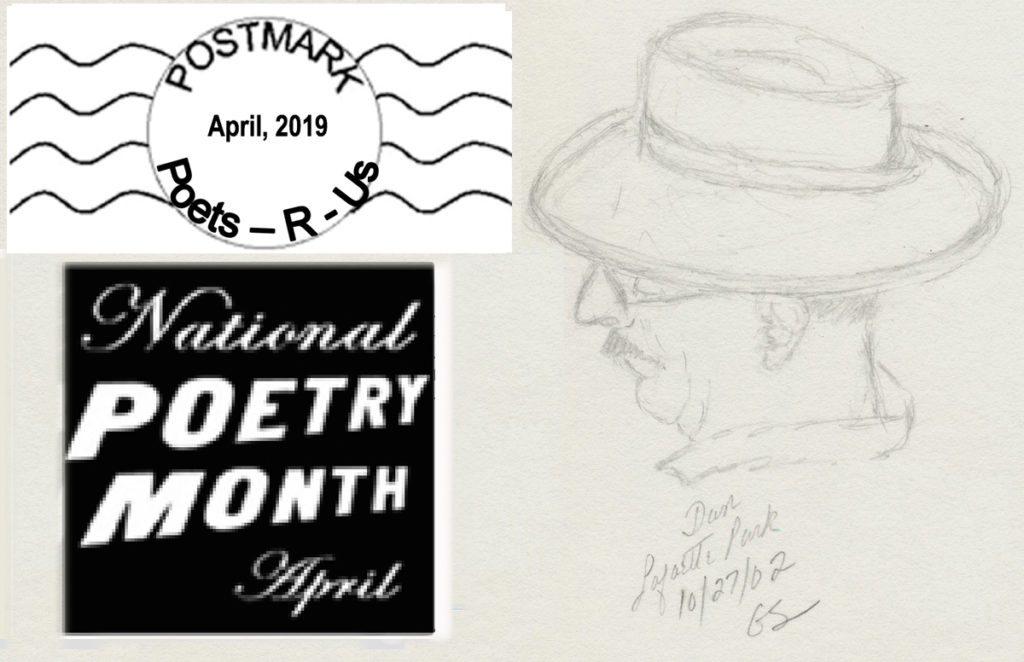
Below are my own meager offerings to celebrate National Poetry Month. I say “meager” because I’m not a poet. In my writing, I specialize in O.S. (that is, Other Stuff). But, to honor the occasion, I offer five poems I wrote and one that was given to me. I wrote the first three in the Ahwahnee “Great Room” in Yosemite this month. They are “hybrid” versions of the sonnet form‚ non-rhyming poems with 14 lines and sonnet-like rhythms. I hope Shakespeare will forgive me. The last one is “mine” only because it was given to me.
Click below to download a PDF of this post:
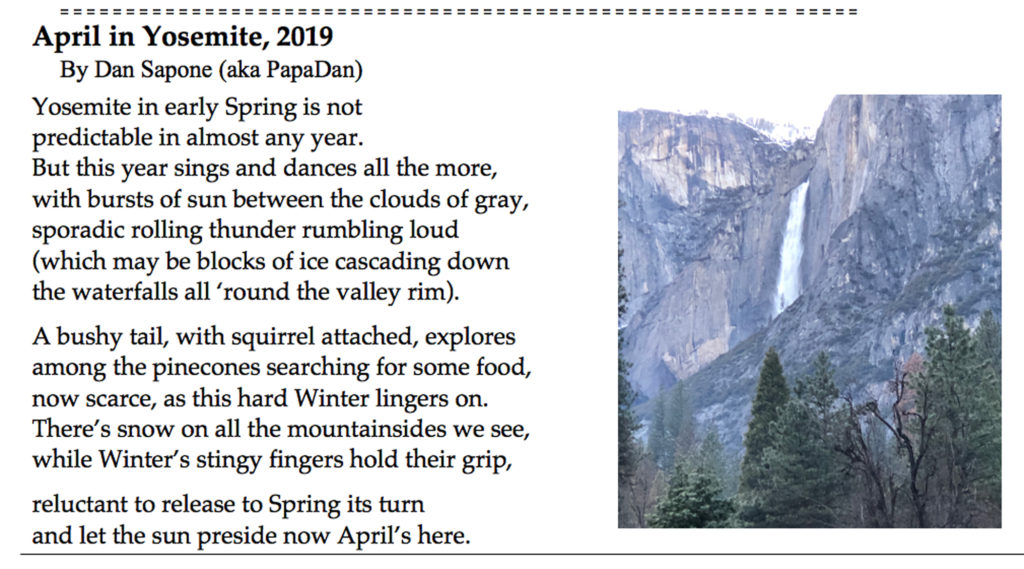
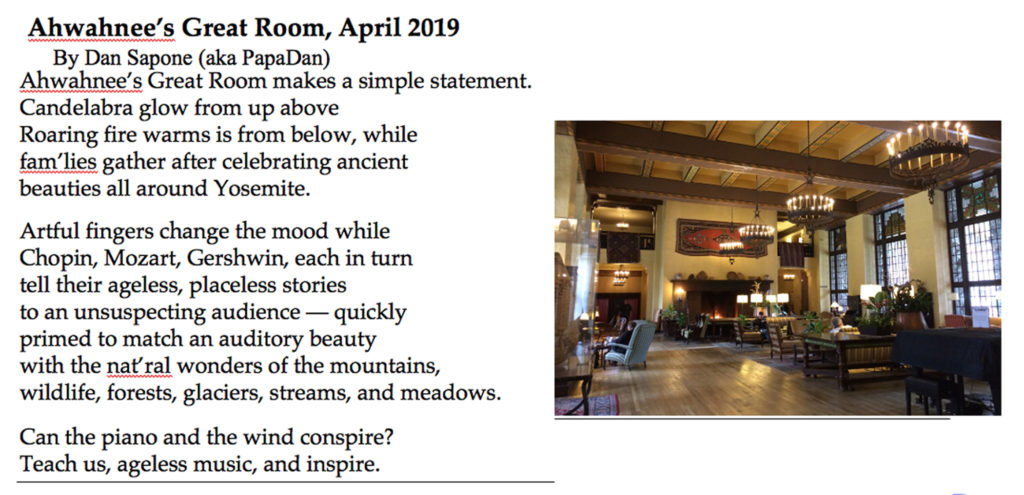
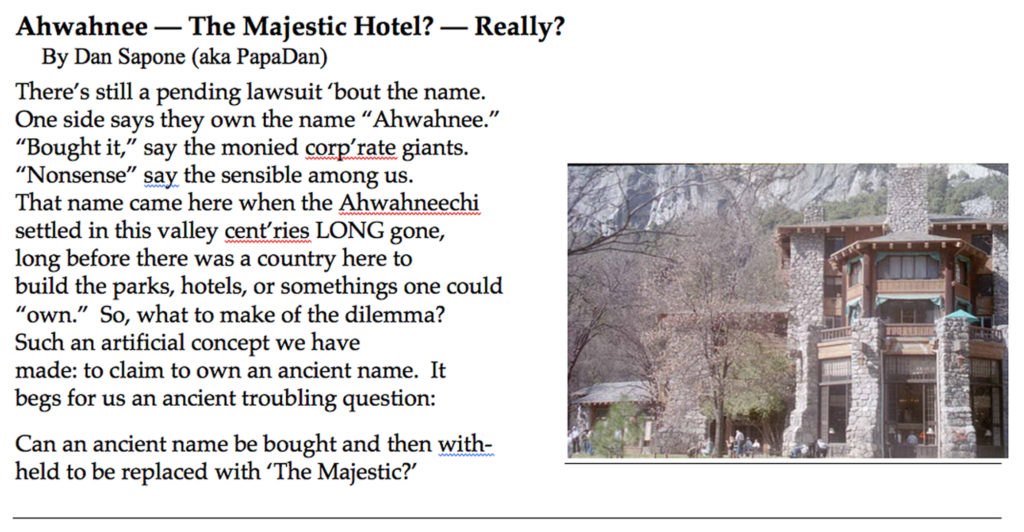
An Older One
I wrote this next free-verse poem in 2013. It was inspired by a painting Gretta and I found in a hotel lobby in Philadelphia on our way to the patio at the back of the hotel beside the river. So, what were we doing wandering the streets of Philadelphia? Let’s start with the back story —
We were on a three-week trip to view the Fall colors in the Northeast. Started in Vermont, crossed New Hampshire, up to Kennebunkport Maine, down to Connecticut, and then — we planned to visit Philadelphia, Washington D.C., and then back up to New York City. The fall colors were spectacular indeed, especially in Vermont and New Hampshire — perhaps a story for another time. –> BUT the United States government, in its infinite wisdom, was shut down at the end of September because the Congress and the White House couldn’t agree on a budget. We weren’t too concerned until we read in the news that, since the city of Washington D.C. is not part of a state, its city budget is governed by the Congress as [art of the Federal budget. SO, city services were stopped and that meant that the garbage was not going to be picked up while we would be there. THAT was the last straw; so, we decided to skip Washington entirely and spend a few extra days in Philadelphia. That led to an afternoon of free time, which we spent walking downtown looking for a place to have a drink and an afternoon snack. So, back to the painting …
Walking through the hotel lobby for the first time, a painting called Figures In a Boat by a local artist, caught my attention and made me ask, “What’s the story?” My first impression is recorded in the first part of the poem (“First Look”). At the end of the afternoon, walking back through the lobby past the painting again, it made a different impression. “Second Look” described that second impression. So, here is my poem, “First Look, Second Look,” in its two parts:
First Look, Second Look
By Dan Sapone (aka PapaDan)
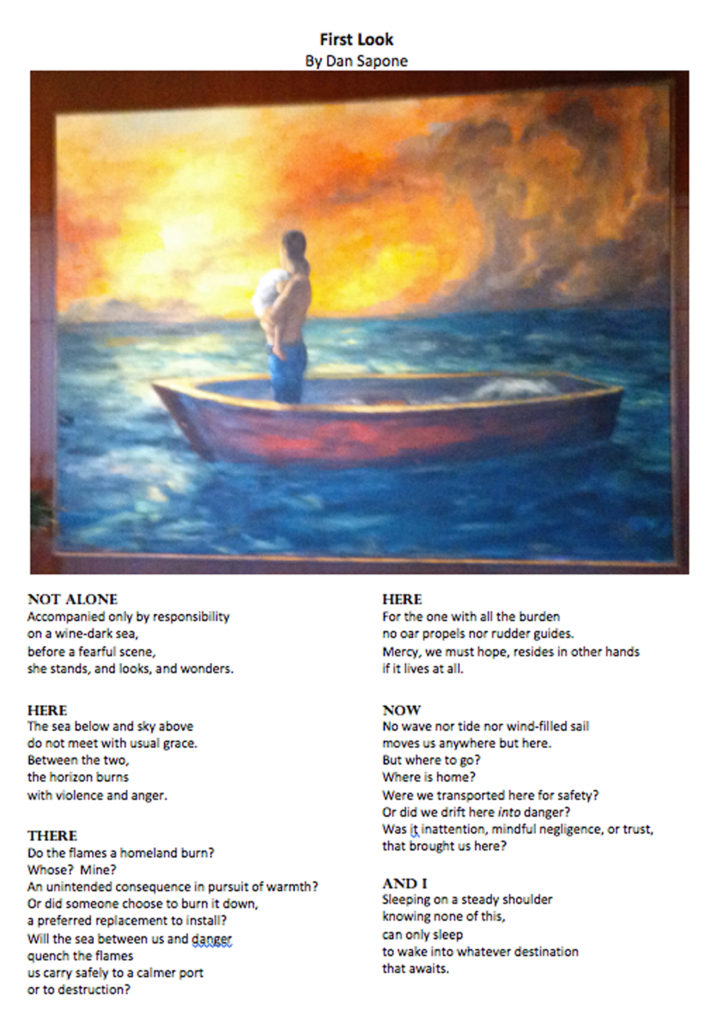
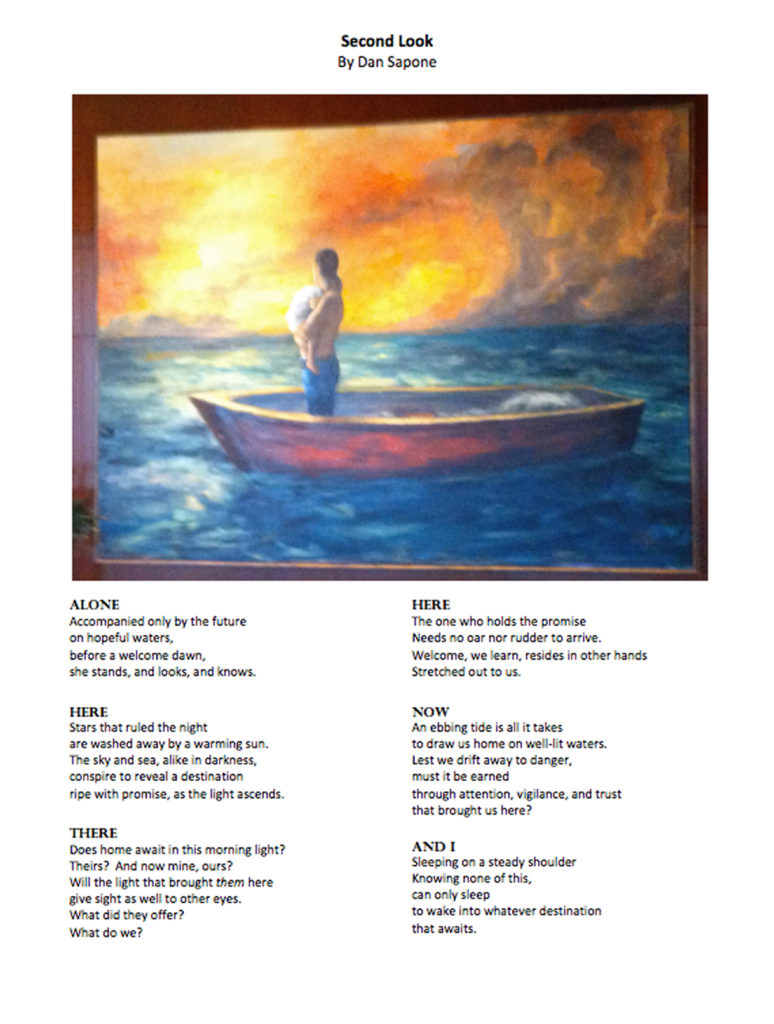
Another Old One
For those interested in the esoterica of poetic rhythm (OK, sure there must be at least ONE of you), here is a completely absurd little … uh … poem about the relative virtues of iambic vs trochaic pentameter. Once again, it violates most of the rules of sonnets — 14 lines and no rhyme but it has some fun with the rhythm.
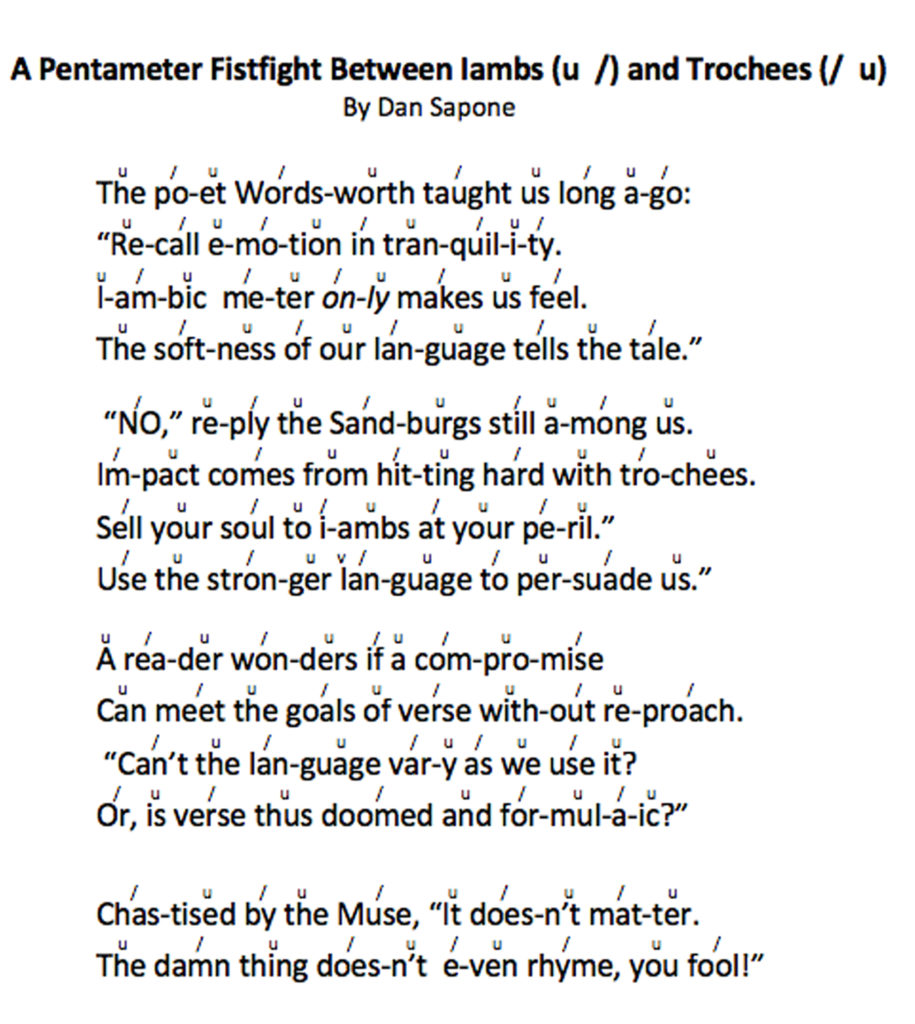
Finally (Honest) A Poem That Was Given To Me (I didn’t write it)
I will call him a humanist. One afternoon fifty-some years ago, my Dad told me to join him in the living room. “Sit down here, Dan, I have something to give you.” He told me that he had a poem to give me and he wanted me to learn it. While he was an avid reader he wasn’t what you’d call a “literary” type; nor was he noticeably a “religious” man. I will call him a humanist. I was not aware of an interest in poetry. He held a book in his hand and I figured he was going to read something to me. But he didn’t open the book but proceeded to “give” the poem to me from memory.
Here it is:
The Touch of the Master’s Hand
By Myra Brooks Welch
It was battered and
scarred, and the auctioneer
Thought it scarcely worth his while
To waste much time on the old violin,
But he held it up with a smile.
“What am I bidden, good folks,” he cried,
“Who’ll start the bidding for me?”
“A dollar, a dollar. Then two! Only two?
Two dollars, and who’ll make it three?”
“Three dollars, once;
three dollars, twice;
Going for three…” But no,
From the room, far back, a grey-haired man
Came forward and picked up the bow;
Then wiping the dust from the old violin,
And tightening its loosened strings,
He played a melody pure and sweet,
As a caroling angel sings.
And when he was done, the
auctioneer,
With a voice that was quiet and low,
Said: “What am I bid for the old violin?”
And he held it up with the bow.
“A thousand dollars, and who’ll make it two?
Two thousand! And who’ll make it three?
Three thousand, once; three thousand, twice,
And going and gone,” said he.
And the people cheered,
but some of them cried,
“We do not quite understand.
What changed its worth?” Swift came the reply:
‘Twas the touch of the Master’s hand.”
And many a man with life out of tune,
And battered and scarred by sin,
Is auctioned cheap to the thoughtless crowd
Much like the old violin.
A
“mess of pottage,” a glass of wine,
A game — and he travels on.
He is “going” once, and “going” twice,
He’s “going” and almost “gone.”
When the Master comes, and the foolish crowd
Never does quite understand
The worth of a soul and the change that’s wrought
By the touch of the Master’s hand.
I hope you have enjoyed National Poetry Month.
Several of you contributed to National Poetry Month.
In case you missed them, here are links to their contributions:
From Dorty: https://convivio-online.net/national-poetry-month-is-here-april-2019/
From Lauren: https://convivio-online.net/lauren-celebrates-national-poetry-month/
From Gretta: https://convivio-online.net/peek-a-boo-where-are-you/
From Steven Peterson: https://convivio-online.net/steve-peterson-celebrates-national-poetry-month/
From Janet: https://convivio-online.net/national-poetry-month-janets-favorites/
From Stephen Faletti: https://convivio-online.net/a-faletti-poetic-contribution/
A Faletti Poetic Contribution
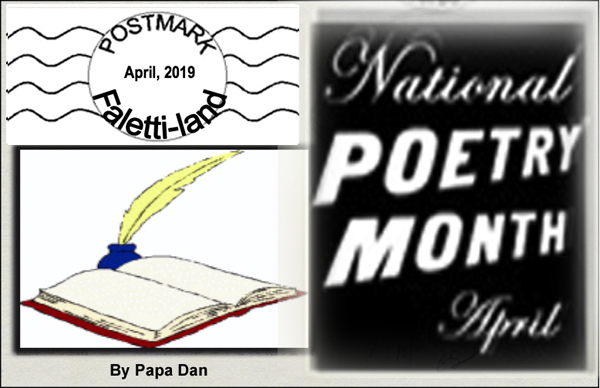
Today, my nephew Andrew Faletti, serves as the Literary Agent for his brother Stephen. In honor of National Poetry Month, Andy offers a poem Steve wrote one January afternoon in 1973, when Steve was a Freshman at Santa Clara University and Andy was in the 9th grade in Antioch, California. Take a look.
Andy writes: “The author (my brother Stephen Faletti) … decades ago submitted to me, as his “official” “agent,” some of his writings to be potentially published. I offered pieces to various poetry magazines and journals — surely hoping that my 15% of any awards would cover the postage and envelopes. ALAS: The poem is no less excellent for my failure to find a publisher.”
= = = = = = = = = = = = = = = = = = = = = = = = = = = = = = = =
Happiness Is Spring — By Stephen Faletti, written one afternoon in January
I strolled along the lively lane
the sun low in the sky;
Somehow I felt a hint of spring,
I’m sure I don’t know why.
It may have been the cool crisp air
Which carried to my ear
the ringing laughter of the kids
Who leapt from houses near;
Or maybe all the birds that chirped
And soared from tree to tree,
Or just the buzzing hum and sound
Of life’s activity.
Then suddenly I chanced to see,
A bit off to the right,
A bushy-tailed small gray squirrel;
It’s fur was shining bright.
I watched it as it skipped around;
It seemed to dance with glee.
And all its wondrous happiness
Became a part of me!
I finally decided to
Continue on my way;
As soon as I began to move
It scampered far away.
That little squirrel of fur so bright
Had made me glad to be;
It may have been the month of snow
But it was spring for me!
= = = = = = = = = = = = = = = = = = = = = = = = = = = = = = = = = = = = = = = = = = =
Several of you contributed to National Poetry Month.
In case you missed them, here are links to five that have been posted before this one:
From Dorty: https://convivio-online.net/national-poetry-month-is-here-april-2019/
From Lauren: https://convivio-online.net/lauren-celebrates-national-poetry-month/
From Gretta: https://convivio-online.net/peek-a-boo-where-are-you/
From Steven: https://convivio-online.net/steve-peterson-celebrates-national-poetry-month/
From Janet: https://convivio-online.net/national-poetry-month-janets-favorites/
National Poetry Month: Janet’s Favorites
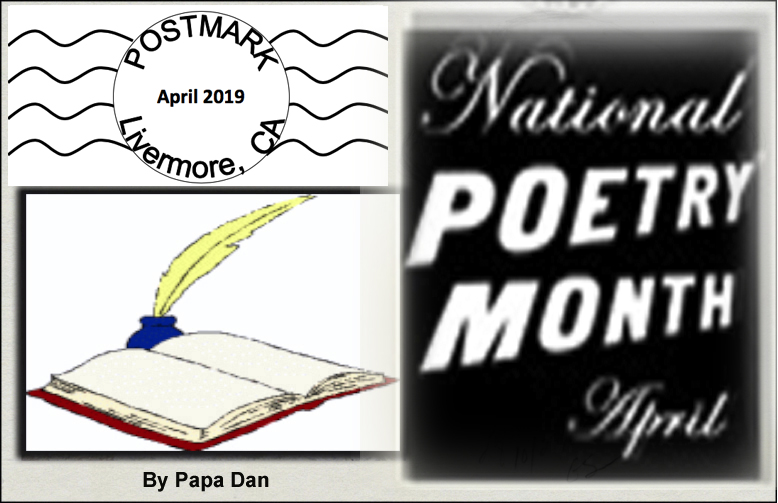
Today,
Janet Pipes offers four of her favorite poems
in honor of National Poetry Month. Take
a look.
I hope you are enjoying National Poetry Month. I expect at least
one more NPM contribution before the month is over. Stay tuned.
Click here to download a PDF of this post:
Several of you contributed to National Poetry Month.
In case you missed them, here are links to four that have been posted so far:
From Dorty: https://convivio-online.net/national-poetry-month-is-here-april-2019/
From Lauren: https://convivio-online.net/lauren-celebrates-national-poetry-month/
From Gretta: https://convivio-online.net/peek-a-boo-where-are-you/
From Steven: https://convivio-online.net/steve-peterson-celebrates-national-poetry-month/
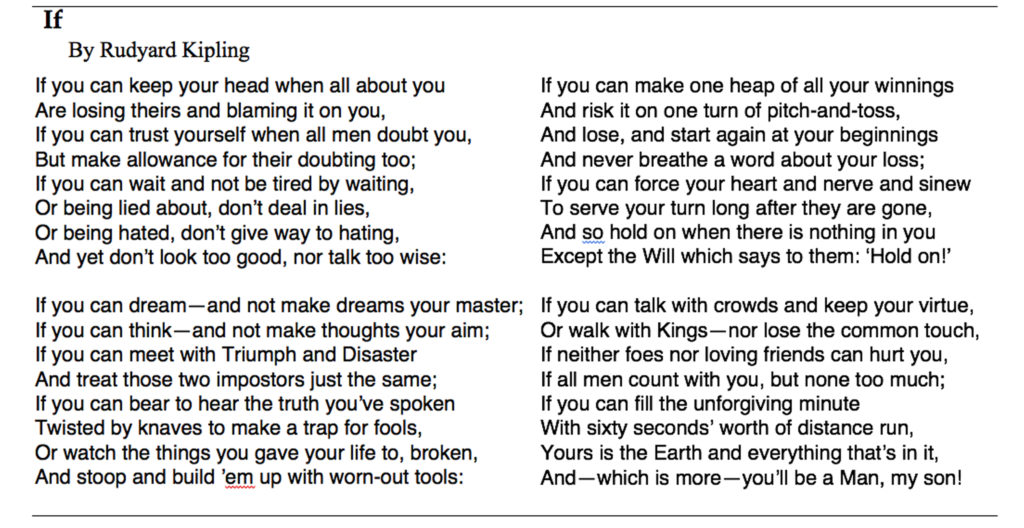
Dreams
By Langston Hughes
Hold fast to dreams
For if dreams die
Life is a broken-winged bird
That cannot fly.
Hold fast to dreams
For when dreams go
Life is a barren field
Frozen with snow.
Desiderata
By Max Ehrmann
GO PLACIDLY amid the noise and the haste, and remember what peace there may be in silence. As far as possible, without surrender, be on good terms with all persons.
Speak your truth quietly and clearly; and listen to others, even to the dull and the ignorant; they too have their story.
Avoid loud and aggressive persons; they are vexatious to the spirit. If you compare yourself with others, you may become vain or bitter, for always there will be greater and lesser persons than yourself.
Enjoy your achievements as well as your plans. Keep interested in your own career, however humble; it is a real possession in the changing fortunes of time.
Exercise caution in your business affairs, for the world is full of trickery. But let this not blind you to what virtue there is; many persons strive for high ideals, and everywhere life is full of heroism.
Be yourself. Especially do not feign affection. Neither be cynical about love; for in the face of all aridity and disenchantment, it is as perennial as the grass.
Take kindly the counsel of the years, gracefully surrendering the things of youth.
Nurture strength of spirit to shield you in sudden misfortune. But do not distress yourself with dark imaginings. Many fears are born of fatigue and loneliness.
Beyond a wholesome discipline, be gentle with yourself. You are a child of the universe no less than the trees and the stars; you have a right to be here.
And whether or not it is clear to you, no doubt the universe is unfolding as it should. Therefore be at peace with God, whatever you conceive Him to be. And whatever your labors and aspirations, in the noisy confusion of life, keep peace in your soul. With all its sham, drudgery and broken dreams, it is still a beautiful world. Be cheerful. Strive to be happy.
The New Colossus by Emma Lazarus
By Emma Lazarus
Not like the brazen giant of Greek fame,
With conquering limbs astride from land to land;
Here at our sea-washed, sunset gates
shall stand
A mighty woman with a torch, whose
flame
Is the imprisoned lightning, and her
name
Mother of Exiles. From her beacon-hand
Glows world-wide welcome; her mild eyes
command
The air-bridged harbor that twin cities
frame.
“Keep, ancient lands, your storied
pomp!” cries she
With silent lips. “Give me your
tired, your poor,
Your huddled masses yearning to breathe
free,
The wretched refuse of your teeming
shore.
Send these, the homeless, tempest-tost
to me,
I lift my lamp beside the golden
door!”
Steve Peterson Celebrates National Poetry Month
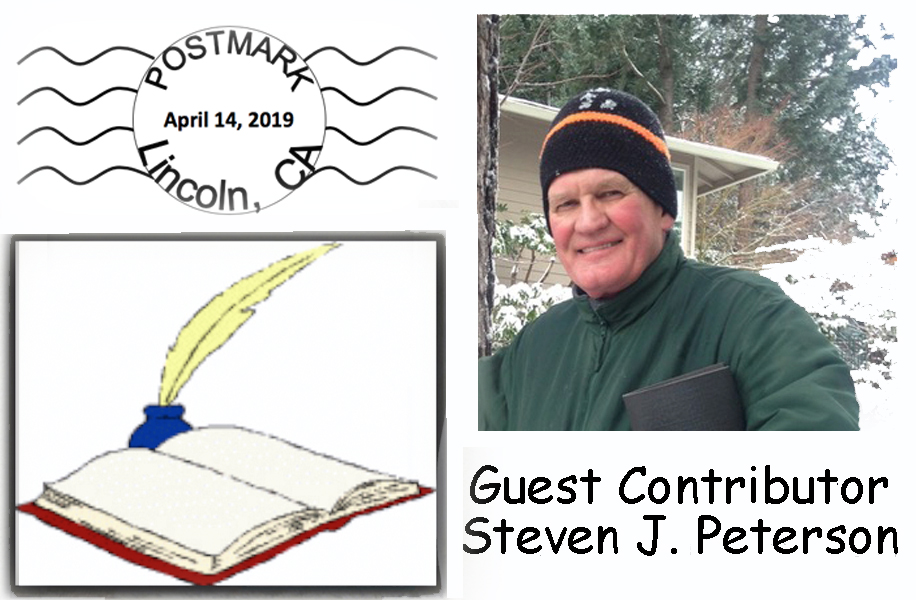
In response to our celebration of National Poetry Month and old friend, and former ConVivio contributor Steven J. Peterson, offers two of his favorite poems.
Steve has appeared on ConVivio before as a
Guest Storyteller. His previous appearance
on ConVivio can be found at:
https://convivio-online.net/gratitude/
Click here to download a PDF of this post:
Steven writes:
Since I read your ConVivio post requesting poems, I have
been thinking about poems that I like.
I recalled that in the 1980s I read a lot of poetry, but have not read poetry
with any consistency in the past twenty years. Makes me wonder how decades slip by so
quickly.
I recalled that when I was in high school I was charmed by Dylan Thomas’s “Fern Hill,” especially the opening line: “Now as I was young and easy under the apple boughs,” which made me think of the first “serious” play I attended at Moorhead (Minnesota) State College, these days called Minnesota State University at Moorhead (MSUM). The play was “Dylan” by Sidney Michaels, written in 1964. I saw it performed in April of 1966 near the end of my junior year of high school, about six weeks before my family moved from Minnesota to California. I thought it was a “great” play, but what did I know? I was two months away from my seventeenth birthday. I would like to see that play again. But never mind about that.
Below are two poems I like, “The Red Wheelbarrow” and “Where They Were and What They Were Doing.”
Steve
============================
The Red Wheelbarrow
by William Carlos Williams, Published in 1923
so much depends
upon
a red wheel
barrow
glazed with rain
water
beside the white
chickens.
Where They Were and What They Were Doing
by Matt Cook
I was looking through Milwaukee newspapers
From the day after John F. Kennedy was shot-
There was this auto body worker
Who brought his BB gun to work that day;
He was arrested for shooting his BB gun
Out the windows of the body plant
At passing automobiles-
That’s where he was and what he was doing
On the day President Kennedy was assassinated.
There was this biochemist.
He was giving this speech at some university in town-
He was inviting the audience to imagine
A strain of pneumonia bacteria
That was wearing a heavy armor suit that was actually made of protein–
That was his public speaking metaphor.
His point was that the protein would act like
A shield against white blood cells.
That’s what that guy was up to that day.
And just outside of town somewhere,
A car slammed into a truck on a rainy highway.
The car guy died of head injuries;
The truck guy was in satisfactory condition with neck pain.
In satisfactory condition with neck pain-
That’s where that guy was, and what he was doing.
The day President Kennedy was shot,
These kids broke into a junior high school.
They stole twenty dollars worth of stamps,
And smashed up an aquarium.
That was their story;
That’s where they were and what they were doing.
“Where They Were and What They Were Doing” by Matt Cook, from In the Small of My Backyard. © Manic D Press, 2002.
Peek-a-Boo, Where Are You?
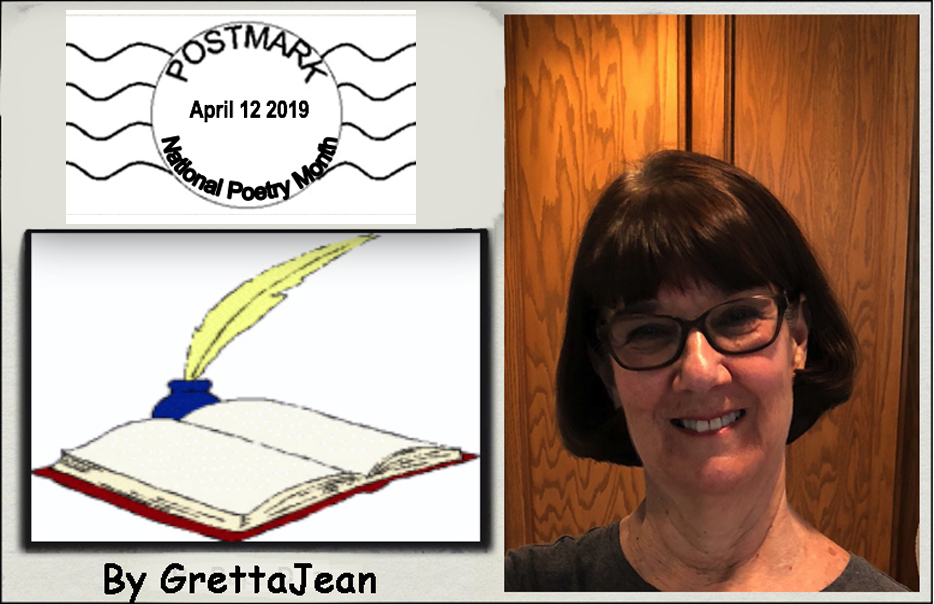
Take a Peek on the lighter side of poetry.
Gretta makes a contribution to
National Poetry Month with this poem.
Gretta has appeared on ConVivio before
with her poetry. Her previous appearance
on ConVivio can be found at:
https://convivio-online.net/poetry-and-plein-air/
Click here to download a PDF of this post:
= = = = = = = = = = = = = = = = = = = =
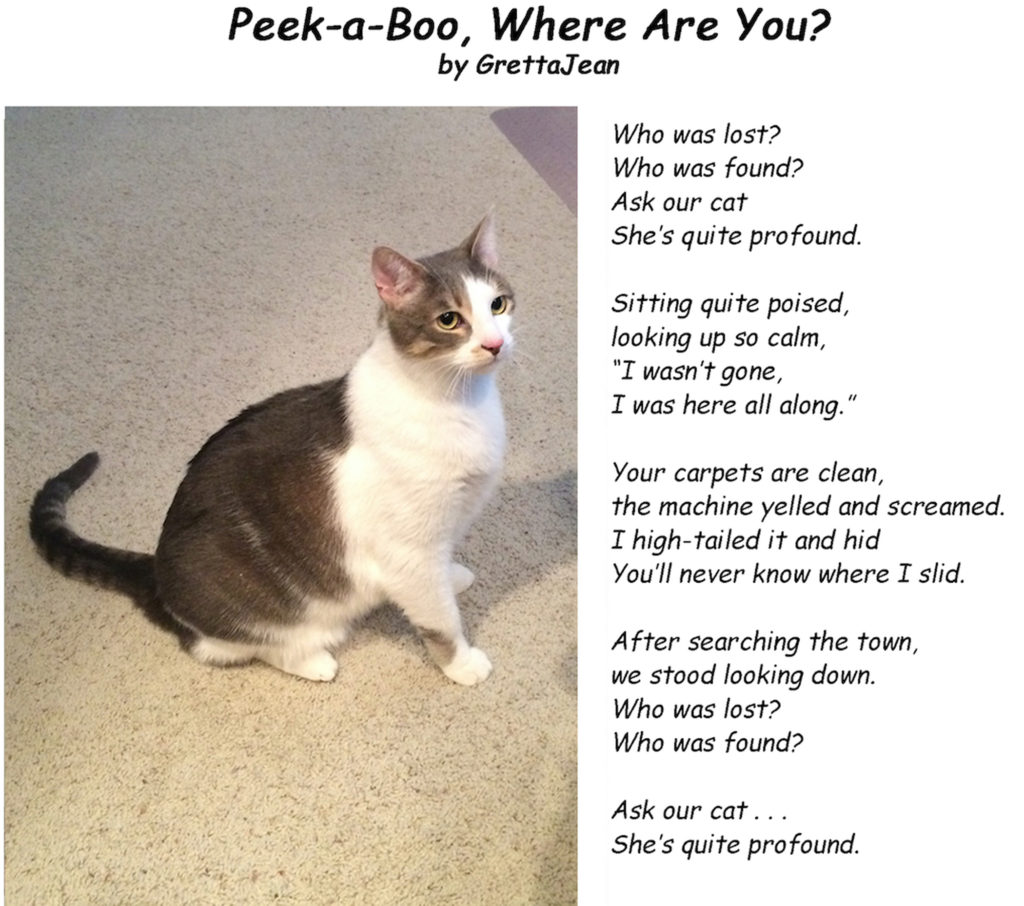
Lauren Celebrates National Poetry Month
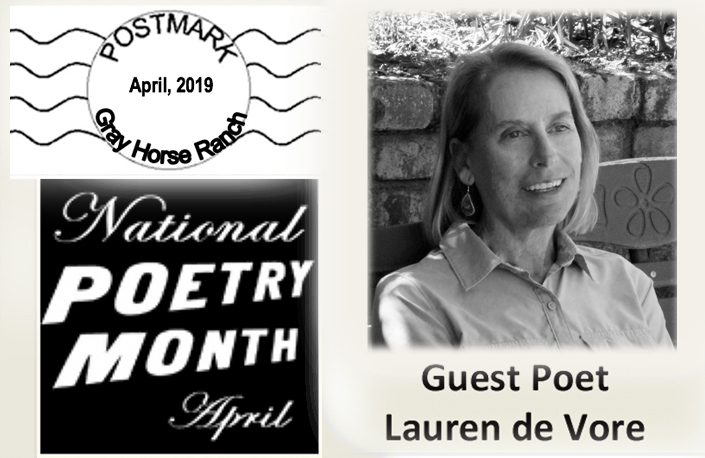
Once again, ConVivio celebrates National Poetry Month with a series of ‘poetic’ posts. Today we are privileged to feature some recent poems by Lauren de Vore, a published Bay Area poet who has appeared on ConVivio a few times before as a Guest Poet.
Enjoy!
.
Click below to download a PDF of this post:
.
Reflections on Events, Current and Otherwise
As much as I try not to dwell on unpleasant things, they have a nasty habit of intruding, kind of like the whine of unseen mosquitos that drives one indoors on an otherwise lovely summer night, into my thoughts and poems. Thus the following…
A short soapbox rant:
Shout it from the Rooftops
Shout it from the rooftops
Shout it from the pulpits and the streets
Shout it at the gas-n-stops
Shout it in your texts, your posts and tweets
The emperor is naked
His crown is but a fake orange lacquered mop
His palace is a house of cards
His courtiers a bunch of spineless fops
Look behind the backdrops
Look past all the bombast and the pomp
Look beyond the photo ops
He’s in bed with those who own the swamp
See the cheating and the lies
See the malice and the venal spite
See how freedom bleeds and dies
Each time hate and chaos trump what’s right?
Blind are those who will not see
Ignorant the ones who will not think
Fight, resist, unwaveringly
Else into that stinking swamp we sink
= = = = = = = = = = = = = = = = = = = = = = = =
Some questions asked and answered:
Because
The paleo man hefted his club,
Brought it down hard on the paleo deer.
Eyes stared back from the blood-soaked ground
Asking why, why do you do this to me?
Because I have the club and you do not.
The lord of the manor lifted his crop
And slashed it across the peasant’s face.
Sullen eyes glared up from the mud
Asking why do you do this to me?
Because I’m of the purple and you are not.
The whaler launched his harpoon,
The big game hunter sighted his prey
And sapient eyes gazed back through the lens
Asking why, what harm have I ever done you?
Because I hold the weapon and you do not.
The slave owner cracked his whip, the officer swings his baton,
A mother, a father raises hand or fist,
And innocent eyes, the eyes of the beaten ask why.
They’re stronger, they’re meaner, they’re in command,
And you, poor soul, are not.
The faith-fueled fanatic waves his torch,
The zealot of left, right or center his flag,
With nary a care for another’s pain, nary a thought
As to why each hates the other one so,
For they are righteous and everyone else be damned.
A god in his heaven rallies his wrath,
His thunder and lightning and hurricanes,
And hurls them down hard onto man below.
And man in his clueless disbelief
Asks why, why do you do this to me?
= = = = = = = = = = = = = = = = = = = = = = = =
Observation on the dubious value of barriers:
Walls
Barricades, fences, and walls
Partitions nature abhors
In the end, every one falls
Over all, time’s army pours
Palisades, ramparts, and dikes
Constructs of hubris and fear
Mindset of rulers and reiches
History’s lesson is clear
For every wall, build a door
For every fence, build a stile
Never forget what they’re for
Else to the despots, seig heil!
= = = = = = = = = = = = = = = = = = = = = = = =
Commentary on apparent American values with regard to immigration:
Immigrants
Two caravans head north,
Driven forces beyond their control.
The miles are long,
Grueling and perilous,
Fraught with predators of every ilk.
Death and despair
Thin their numbers,
But the caravans push on,
Sinuous entities seeking
A land of peace and plenty,
For there is no going back;
Going back is certain death.
Far better to venture into the unknown,
To hope against hope,
And trust whatever powers there be
To guide them to safety.
And when at last they arrive?
Jubilation greets the one,
Reverence and joy, festivals and delight.
And the other? The other is met
With guns and walls, with scorn
And denigration and detention.
Two caravans of immigrants
Seeking sanctuary.
Who knew one had to be decked
In orange and black butterfly wings
To be welcome.
= = = = = = = = = = = = = = = = = = = = = = = =
In memory of Sandra Parks, Steve Slaughter, and the countless other victims of senseless violence:
= = = = = = = = = = = = = = = = = = = = = = = =
Cogitations of a sleepless night:
Past Midnight
It was one of those nights
When her brain wouldn’t turn off
As she lay in bed, a lone soul keeping vigil
While the rest of the world slept.
The grandfather clock in the front room
Te-tick-tocked the seconds away,
A-lone-all a-lone-all a-lone it repeated.
Yet she did not need a clock to tell the time,
For the radio was quietly playing,
And on the radio, it’s always past midnight.
The measured cadences of NPR
Or the late-night DJ talking, talking, talking
To himself, to her, to the brother-slash-sisterhood
Of night owls and insomniacs,
Unknown to each other yet connected
By invisible airwaves. Soon the night
Will turn to dawn and she will rise
To face the day, but it’s always
Past midnight on the radio.
= = = = = = = = = = = = = = = = = = = = = = = =
And in the night, remembering…
Empty House
She wanders through the house, its lone occupant.
A faint trace of her youngest lingers in one room
And if she looked she’d likely find an old shirt
Or shoe, but she closes the door and wanders on.
It used to be so full of noise and bustle,
Husband and children and critters, everyone
Rushing this way and that at the top of their lungs.
But the hamsters and fish and dogs grew old and died,
The kids grew up and away, and the husband
Took up with a new and improved model of wife.
The house is silent now, dust-free and orderly
After all the years of nagging and fussing
Over messy rooms and muddy floors. Everything
Is just the way she likes it. Only it’s not.
For the house is empty, and she’s becoming
A ghost. Maybe, she thinks, she should get a cat.
= = = = = = = = = = = = = = = = = = = = = = = =
Visioned while standing with my horse as he grazed in the morning sun:
Ah, To Be Grass
Supine I lie
Face to the sun
Earth bed beneath
Taste the rain, the fine champagne
The dark aged chocolate loam
Root finger toes reach out and grasp
Holdfasts to the world below
Chlorophylled, wind-waved
My hair covers the rough
And smooth like a velvet shroud
Trodden, trampled
Grazed, parched, fired, frozen
I am dis-tressed
Beaten down, but not beaten
For come rain, come spring
All is green again
Ah, to be grass
= = = = = = = = = = = = = = = = = = = = = = = =
Reaction to being addressed by a server too young to know better:
Ma’am’d be Damned!
When did I turn from a miss to a ma’am,
From mademoiselle to madam?
The face in the mirror looks mostly the same,
To all of my teeth I lay claim,
I’m slim in the hip, my pulse doesn’t skip,
On mem’ry I’ve got a firm grip.
With gadgets and tech I’m fairly adept,
Up with Kimmel, Colbert I have kept;
Though hip hop and rap leave me quite cold,
Lin Man Miranda is gold.
I love anime and practice feng shui,
So what is it gives me away?
Have I some aura, some faint pheromone,
Does my voice quave some telltale tone?
For I’m forced to admit, I’m tempted to spit
Or at least indulge in a snit
Whenever I’m hailed with madam or ma’am,
That unwanted age-implied slam.
Can you not see I’m just ent’ring my prime
With many a hill yet to climb,
And per adage most sage, years are no gauge
Of actual sine qua non age.
So till I start flaunting sensible shoes,
Start dying my gold-y locks blue,
Until I appear in bright purple clothes,
In red hats with feathers and bows,
Humor please, if you’d be so polite,
For someday you’ll be in my plight;
Say ms if you must or miss if you will,
And all will be cool, will be chill.
I may be old mutton dressed up as spring lamb,
But madam’d or ma’am’d I’ll be damned!
National Poetry Month Is Here — April 2019
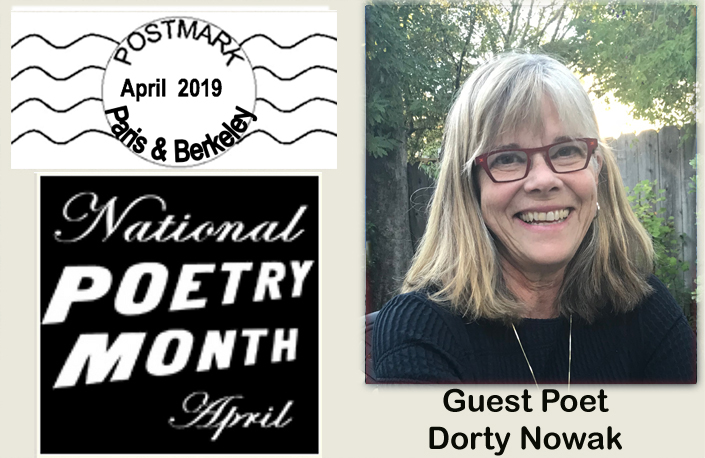
Dorty Nowak is a writer and artist living in Paris and Berkeley who writes frequently about the challenges and delights of multi-cultural living. Among life-long achievements, she helped found the Oakland School for the Arts and contributes to artistic projects on two continents. Dorty was ConVivio’s first ‘Guest Poet’ (has it really been) nine years ago.
We welcome her back as today’s ‘Guest Poet.’
— Click below to download a PDF of this post:
◊◊◊◊◊◊◊◊◊◊◊◊◊◊◊◊◊◊◊◊◊◊◊◊◊◊◊◊◊◊◊◊◊◊◊◊◊◊◊◊◊◊◊◊◊◊◊◊◊◊◊◊◊◊
ConVivio Again Presents “Guest Poets” for National Poetry Month
In celebration of National Poetry Month, Dorty Nowak returns to ConVivio and offers the following poems by “two of the greatest in the English language.” She observes that “old age and death have long been fertile subjects for poets, among them T.S. Eliot and Dylan Thomas.” In that category, she offers Eliot’s “The Love Song of J. Alfred Prufrock” and “Do Not Go Gentle Into That Good Night” by Dylan Thomas. And, as she has said before, “because I’ll never pass up a chance for extra credit” she gives us one of her own creations.
From Dorty Nowak
Dorty introduces Eliot’s “The Love Song of J. Alfred Prufrock” with a story: “Recently I listened to a recorded talk Eliot gave in 1950 in which he said “The Love Song of J. Alfred Prufrock” embarrassed him. Since that remarkable monologue helped catapult him, at age twenty-six, to fame, I was surprised. Eliot didn’t elaborate on his embarrassment, leaving me to assume it was because he considered himself not yet a master of his craft. However, poetics aside, Eliot created in ‘Prufrock’ a narrator poignantly and perceptively meditating on the limitations of age. For a young poet to have accomplished that is nothing to be embarrassed about.”
The
Love Song of J. Alfred Prufrock
by T.S. Eliot
S’io credesse che mia risposta fosse
A persona che mai tornasse al mondo,
Questa fiamma staria senza piu scosse.
Ma percioche giammai di questo fondo
Non torno vivo alcun, s’i’odo il vero,
Senza tema d’infamia ti rispondo.
Let us go then, you and I,
When the evening is spread out against the sky
Like a patient etherized upon a table;
Let us go, through certain half-deserted streets,
The muttering retreats
Of restless nights in one-night cheap hotels
And sawdust restaurants with oyster-shells:
Streets that follow like a tedious argument
Of insidious intent
To lead you to an overwhelming question …
Oh, do not ask, “What is it?”
Let us go and make our visit.
In the room the women come and go
Talking of Michelangelo.
The yellow fog that rubs its back upon the window-panes,
The yellow smoke that rubs its muzzle on the window-panes,
Licked its tongue into the corners of the evening,
Lingered upon the pools that stand in drains,
Let fall upon its back the soot that falls from chimneys,
Slipped by the terrace, made a sudden leap,
And seeing that it was a soft October night,
Curled once about the house, and fell asleep.
And indeed there will be time
For the yellow smoke that slides along the street,
Rubbing its back upon the window-panes;
There will be time, there will be time
To prepare a face to meet the faces that you meet;
There will be time to murder and create,
And time for all the works and days of hands
That lift and drop a question on your plate;
Time for you and time for me,
And time yet for a hundred indecisions,
And for a hundred visions and revisions,
Before the taking of a toast and tea.
In the room the women come and go
Talking of Michelangelo.
And indeed there will be time
To wonder, “Do I dare?” and, “Do I dare?”
Time to turn back and descend the stair,
With a bald spot in the middle of my hair —
(They will say: “How his hair is growing thin!”)
My morning coat, my collar mounting firmly to the chin,
My necktie rich and modest, but asserted by a simple pin —
(They will say: “But how his arms and legs are thin!”)
Do I dare
Disturb the universe?
In a minute there is time
For decisions and revisions which a minute will reverse.
For I have known them all already, known them all:
Have known the evenings, mornings, afternoons,
I have measured out my life with coffee spoons;
I know the voices dying with a dying fall
Beneath the music from a farther room.
So how should I presume?
And I have known the eyes already, known them all—
The eyes that fix you in a formulated phrase,
And when I am formulated, sprawling on a pin,
When I am pinned and wriggling on the wall,
Then how should I begin
To spit out all the butt-ends of my days and ways?
And how should I presume?
And I have known the arms already, known them all—
Arms that are braceleted and white and bare
(But in the lamplight, downed with light brown hair!)
Is it perfume from a dress
That makes me so digress?
Arms that lie along a table, or wrap about a shawl.
And should I then presume?
And how should I begin?
Shall I say, I have gone at dusk through narrow streets
And watched the smoke that rises from the pipes
Of lonely men in shirt-sleeves, leaning out of windows? …
I should have been a pair of ragged claws
Scuttling across the floors of silent seas.
And the afternoon, the evening, sleeps so peacefully!
Smoothed by long fingers,
Asleep … tired … or it malingers,
Stretched on the floor, here beside you and me.
Should I, after tea and cakes and ices,
Have the strength to force the moment to its crisis?
But though I have wept and fasted, wept and prayed,
Though I have seen my head (grown slightly bald) brought in upon a platter,
I am no prophet — and here’s no great matter;
I have seen the moment of my greatness flicker,
And I have seen the eternal Footman hold my coat, and snicker,
And in short, I was afraid.
And would it have been worth it, after all,
After the cups, the marmalade, the tea,
Among the porcelain, among some talk of you and me,
Would it have been worth while,
To have bitten off the matter with a smile,
To have squeezed the universe into a ball
To roll it towards some overwhelming question,
To say: “I am Lazarus, come from the dead,
Come back to tell you all, I shall tell you all”—
If one, settling a pillow by her head
Should say: “That is not what I meant at all;
That is not it at all.”
And would it have been worth it, after all,
Would it have been worth while,
After the sunsets and the dooryards and the sprinkled streets,
After the novels, after the teacups, after the skirts that trail along the floor—
And this, and so much more?—
It is impossible to say just what I mean!
But as if a magic lantern threw the nerves in patterns on a screen:
Would it have been worth while
If one, settling a pillow or throwing off a shawl,
And turning toward the window, should say:
“That is not it at all.”
That is not what I meant, at all.”
No! I am not Prince Hamlet, nor was meant to be;
Am an attendant lord, one that will do
To swell a progress, start a scene or two,
Advise the prince; no doubt, an easy tool,
Deferential, glad to be of use,
Politic, cautious, and meticulous;
Full of high sentence, but a bit obtuse;
At times, indeed, almost ridiculous—
Almost, at times, the Fool.
I grow old … I grow old …
I shall wear the bottoms of my trousers rolled.
Shall I part my hair behind? Do I dare to eat a peach?
I shall wear white flannel trousers, and walk upon the beach.
I have heard the mermaids singing, each to each.
I do not think that they will sing to me.
I have seen them riding seaward on the waves
Combing the white hair of the waves blown back
When the wind blows the water white and black.
We have lingered in the chambers of the sea
By sea-girls wreathed with seaweed red and brown
Till human voices wake us, and we drown.
— T.S. Eliot, 1915
————————————————————————–
Dorty notes that “Dylan Thomas’ celebrated poem “Do Not Go Gentle Into That Good Night” is very different in tone. Written a few years before his death at age thirty-nine, the poem is an exhortation specifically to his father, but generally to mankind, not to give in to the accumulated disappointments and frailties of age. Unlike “Prufrock” Thomas’ poem doesn’t dwell on specifics to make its case but rather relies on the raw power of emotion magnified by phrase repetition.”
Do
Not Go Gentle Into That Good Night
by Dylan Thomas, published 1951
Do not go gentle into that good night,
Old age should burn and rave at close of day;
Rage, rage against the dying of the light.
Though wise men at their end know dark is right,
Because their words had forked no lightning they
Do not go gentle into that good night.
Good men, the last wave by, crying how bright
Their frail deeds might have danced in a green bay,
Rage, rage against the dying of the light.
Wild men who caught and sang the sun in flight,
And learn, too late, they grieved it on its way,
Do not go gentle into that good night.
Grave men, near death, who see with blinding sight
Blind eyes could blaze like meteors and be gay,
Rage, rage against the dying of the light.
And you, my father, there on the sad height,
Curse, bless, me now with your fierce tears, I pray.
Do not go gentle into that good night.
Rage, rage against the dying of the light.
——————————————————————–
Again, from Dorty — “A few years ago, I wrote ‘Coda’ as a tribute to my grandmother. It’s a poem I couldn’t have written as a young person. Now a grandmother myself, I understand what my grandmother taught me, by example, about courage and resilience.”
Coda
By Dorty Nowak, (published by Drunk Monkeys in 2017)
Too big for your body, the whale of a bed will go on sale; also the dresser, its
three-linked mirrors tall as sails.
I empty drawers of froth-edged linens sent from Sligo, clippings from concerts that spoke of early promise, a few hairpins. Find, beneath a crush of scarves, a silk sack, striped silver and gold. Inside,
a prosthetic breast.
Flayed by a country doctor when I was thirty-three.
I cradle its weight in my hand. You ask to keep it, a bit of ballast.
In the last drawer, two boxes of dime store jewels, gifts from music students. I run beads smooth as seaweed through my fingers, dangle jeweled earrings. Their cast-off colors dance on the surface of the pale green spread. You know the name of each child. The boxes, and their names, go with you.
Only the piano is left, shipped from Austria, a gift from your father when you were six. Grand vessel you commanded through two wars, both a brother and husband disabled young. Sorrows you never spoke flowed from your fingers.
Nana, what shall I do with the piano?
Play it.
National Poetry Month Continues
Many thanks to Dorty Nowak for accepting my invitation to serve as ‘Guest Poet’ on ConVivio, once again. You can see Dorty’s previous appearance as a ‘Guest Poet’ on ConVivio at:
——-> Since ‘National Poetry Month’ is . . . well . . . a month long, next week we will be privileged to have an offering from another of our previous ‘Guest Poets’ — Lauren de Vore. Look for that. Others are in the works — we’ll have to wait and see what appears! Dorty and Lauren and I hope that others (YES, YOU!) will take advantage of the opportunity to contribute some of your favorites— either poems written by others or their own creations.
Go For It! There’s a whole month left of National Poetry Month! What are you waiting for?
Poetry and Plein Air
By GrettaJean
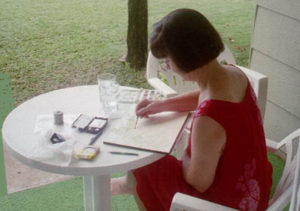
Click here to download a PDF of this page: Poetry_Plein Air_YosTrail_Bobcat_FINAL_lite
= = = = = = = = = = = = = = = = = = = = = = = = = = = = = = = = = = = = = = = = = =
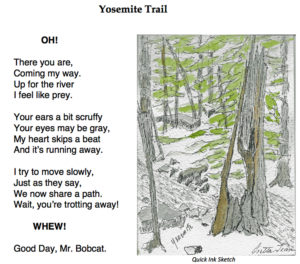
Two Writers We Know Win Awards

Last month, two writers whose work has appeared on ConVivio were awarded “Honorable Mention” in the 2018 Writer’s Digest Annual writing Contest. They were selected from among 5,300 submissions.
Click here to print a PDF of this post:
85-Two Award_winners_Sep21_2018
In this year’s annual competition:
• One poem by Lauren de Vore was selected in the “Rhyming Poetry” category.
• One short story by Dan Sapone was selected in the “Literary Short Story” category.
These two winning pieces are reproduced below.
I Wish That It Had Snowed Last Night
I wish that it had snowed last night,
That I had waked to endless white,
Perhaps a soft and muted quilt
Or shimmering like diamonds spilt,
That hides the daily muck and mess,
The faults and flaws and ugliness,
And for a fleeting hour or two
The world is virginal and new.
And if there’s like to be no snow,
I’ll wish to live where trade winds blow,
Close by the shore and crescent beach
O’erwhich the tides twice daily reach.
I’ll leave my footprints in the sand
‘Midst flotsam cast upon the strand,
Knowing the sea will wash all clean
And leave behind a beach pristine.
I wish there were somehow a way
To live again a certain day,
An hour, an instant, and undo
Those wrongs of mine, those deeds I rue.
As winter snow hides last year’s sin
And spring makes all brand new again,
I wish there were such grace for me,
Some way to set my conscience free.
But lives are more than fields and hills
O’er which fate blows where’er it wills,
And conscience can’t of its debris
Be swept clean by a foaming sea.
So sins and secrets I must bear
Till all that’s left of me is air,
And snow falls soft and white upon
An unspoiled beach at just past dawn.
—— Lauren de Vore (Janury 22, 2018)
All rights reserved
Lauren’s previous contributions on ConVivio can be found at:
https://convivio-online.net/kristof-poetry-contest/
https://convivio-online.net/guest-poet-lauren-de-vore/
https://convivio-online.net/celebrating-national-poetry-month/
= = = = = = = = = = = =
Below is “A Different Kind of September” by PapaDan
A Different Kind of September
September 15, 2015, Savelli, Calabria, Italia
The end of summer was hard to take for Giovanni. Something was missing and he knew what it was. Since he was six years old, September had always meant the summer was over and school was about to start. For years, he and his friends could conduct their September ritual of moaning about how short the vacation had been and the unfairness of being forced to return to school when it still felt like summer. In spite of that unpleasantness, at least they were returning to familiar surroundings and the same collection of friends. In those days, at least they knew what to expect from September.
Of course, by the time they all graduated from high school in 2010 and went their separate ways, everything changed. For Giovanni —everyone called him Gio — the next five Septembers had meant packing up the contents of his room in his parents’ home in Savelli and heading north for the Fall semester at the University of Salerno, about two hundred miles from home. Once he became comfortable with his life as a college student, September became familiar once again. But today, after graduating in June from Salerno’s class of 2015, all of the familiarity and certainty of September had evaporated. This was unfamiliar territory for him and he wasn’t sure how to feel about it.
Looking back, his college career had started well enough. His father had been pleased that Gio would be the first member of the Zappia family to be educated beyond high school. The general pattern for boys who grew up in this part of Calabria, near the bottom of the ‘boot’ of Italy, was to follow their fathers into one of the local factories — ironwork, stonework, heating, metal fabrication – and work their way as far up in the company as their diligence and skill would take them. But his father often reminded his son of his different vision: that Gio would come back to Savelli with a degree from the Business Studies Department at the university and rise to the upper echelon of his company’s management. It was a fairly large company and, with a degree in business, there was money to be made.
However, once Gio showed up at the university, his eyes were opened to a broader vision. It turned out that right next to the low, brick building that housed the Dipartimento di Scienze Aziendali e Ricerca (Department of Business Studies and Research) was another building that seemed more interesting on the outside and, much later, turned out to be much more interesting on the inside as well. This venerable red-tiled marble structure had a blue sign that said:
Dipartimento di Scienze Umane: Department of Humanities:
Filologia, Letteratura, Lingue, Storia Philosophy, Literature, Languages, History
Showing up for his first appointment with Professor Tommasetti, the Dean of the Business Studies Department, he paused to admire the renaissance-era structure next door, looked at his watch, and hurried into the brick building to do his duty.
Professor Tommasetti was pleasant enough; his impeccable Italian had the flowing and precise lilt of a Milanése dialect, as distinct from the more casual Calabrése sounds that Gio had grown up with. “Benvenuto, Señoré Zappia. Non ti chiamano Giovanni?”
“Mi chiamano Gio, mon Professoré,” he answered, trying to match his formality.
“Così, Giovanni, perché pensa di studiare Aziendali?”
Gio was immediately surprised by two things — he didn’t expect to be asked WHY he intended to study business and he noticed that the professor called him Giovanni even though he had just told him he was called Gio. He answered Professor Tommasetti’s question honestly: “Mio padre si auspetta che io diventi un managiatoia nella fabrica del ferro, in Savelli.” [My father expects me to become a manager in the iron factory in Savelli.”]
After looking at him awhile, the professor corrected him that he hadn’t asked why HIS FATHER wanted him to study business; he wanted to know why HE planned to do that. Gio quickly decided that the interview wasn’t going well and hoped some enthusiasm would salvage it. “Io sono il primo della mia famiglia ad andare all università.” He was proud to be the first in his family to go to the university. He thought that might help.
Professor Tommassetti changed the subject and told Gio that he would begin with introductory courses in accounting and business theory, both of which were taught in “his” building. He would also fulfill a general-education requirement in world literature — with an indifferent wave of his hand — in the building next door. He stood up and dismissed him with a gesture toward the door. “Buona giornata, Giovanni.”
“Molte grazie, professoré.” And he was, indeed, thankful to be out the door. And so, it began.
By the end of his second year at Salerno, Gio had a decision to make. During his first two years he had taken the required lower-division business courses and had filled the general education and elective slots in his schedule with courses in World Literature, Philosophy, and English as a Second Language. He enjoyed these courses and had become quite proficient in English.
Preparing for the required Spring interview with the Business Studies Department Head, Gio made three observations. First, he realized that he actually dreaded his required business courses and, whether it was the cause or the effect, he did not do well in those courses.
Second, it had not taken long for him to realize that he derived the greatest enjoyment from his English language, composition, and literature courses. He admired writers, especially the playwrights and novelists, who could make characters come to life on the page. He especially loved the characters of Shakespeare who sometimes spoke directly to the audience. Works of fiction, he was learning, were vehicles for shining light on the truth of what was going on between — and within — human beings. He hoped to write such stories and wanted to learn the techniques writers used to connect with audiences.
His third realization had come after a meeting with his English literature professor. He had gone to Professor Martelli’s office to discuss a paper he was writing about two of the plays of William Shakespeare. He knocked on the office door and found it open.
“Buon Giorno, professoré, posso entrare?” “Good day, professor. May I come in?”
“Yes, come in, but remember my rule — in my class we are studying English literature, so we must speak in English. Let us follow my rule here in my office as well. Capicé?”
“Yes, sir, Thank you. My name is Gio Zappia. I am in your Shakespeare class.”
“Yes, I remember your work. Please sit down.”
Gio began, “I noticed in ‘Romeo and Juliet’ and ‘Two Gentlemen of Verona’ that the writer seemed to know a lot about that Italian city and the history of the two famous, feuding Veronése families — the Montecchi and Cappeletti. In your lecture you mentioned that Shakespeare was born in Stratford and lived in London and there was no evidence that he ever traveled outside of his own country. I am wondering how this man who never left England in the early 16th century could know so much about a small town in northern Italy.”
Professor Martelli looked at him for a long moment and said, “Gio, you have stumbled on a controversy that scholars have debated for a long time. Some have suggested that the William Shakespeare we know from Stratford could not have written these plays. A Sicilian professor, Martino Iuvara, has written that this playwright was in fact not English at all, but Italian. He claimed to have evidence that the plays were written by a man from Messina named Crollalanza. According to Iuvara, Crollalanza fell in love with a 16-year-old named Giulietta, her parents opposed their marriage, she committed suicide, he fled to England, changed his name to its English equivalent (crolla = shaken; lancia = spear), and wrote a play about her. Professor Iuvara’s evidence includes a play Crollalanza left behind in Sicily called Tanto Traffico Per Niente.”
“Much traffic for nothing?”
“Crollalanza’s father was said to have owned a home built by a stonemason named Otelo who murdered his wife in a jealous rage. It’s all in Iuvara’s published work.”
“Then it’s true?”
Professor Martelli’s smile was kind. “It’s the most ridiculous story I have ever heard. Nobody takes it seriously. Apparently, they allowed just anybody to publish in Sicilian literary journals back in the 1950s.”
“Professor, is there a better answer?”
“I’m sorry that I can’t explain Shakespeare’s knowledge of Italy; but Senoré Zappia, you are the first student I have known here at Salerno, who has attempted to do any serious study of Shakespeare. Most of your fellow Calabrési find Shakespeare to be a challenge, so they do their best to avoid him. Your paper last month about his use of language in the history plays was remarkable. So, I have a serious question for you. Why are you pursuing your degree in the Business Department?”
After a moment Gio replied, “Professor Tommasetti asked me the same question at the beginning of my freshman year. I didn’t have a good answer for him then and I don’t have a better one for you now.”
“So, cosa pensa di fare, Giovanni?”
“I’m not sure what to do about it, professoré. My father expects me to return to Savelli with a degree in business. I suppose I have some thinking to do.”
“Yes, think about it — right after you write your paper. It is due on Monday.”
“Yes, right after. Thank you for your time. Molte grazie, professoré.”
This time, he meant it.
A month later, when the Spring term ended, the train ride home to Savelli seemed longer than it had after previous semesters. It was the usual three hours with a stopover at Lamezia; the same yellow colza blossoms typical of late spring in Calabria punctuated the broad expanse of green grass along the tracks; but none of it held his attention. All he could think about was his father’s likely reaction when he told him that a degree in Business would be a waste of time for him. Staring out the window, he rehearsed how he would introduce his idea to change his degree program to the Department of Humanities. He considered starting with his interest in English literature. Or maybe he should admit to his distaste for business. Either way, he assumed his father would be angry and disappointed. Or maybe he should try a more practical approach – he could become a teacher, and maybe, someday he could be a writer … maybe travel.
All of the conversations he imagined during the long train ride went badly. Then, on top of it all, he reminded himself that his father had arranged for a summer job at the metalworks plant; he would start on Monday. This was going to be a bad day.
His father was waiting in the car at the Catanzaro train station when Gio climbed down the steps from the platform. He put his bags in the back and settled into the front seat for the thirty-minute ride home to Savelli. Gio had finally decided that his father had never been thoughtless or harsh. He had spoken often of the life as a factory manager that he wanted for his son; but he was not stupid. Gio figured he’d just tell him the blunt truth and hope for the best. So, he set aside his fear and began, “Papa … ”; but his father interrupted by handing him a letter. It was addressed to him, Senoré Giovanni Zappia, but the envelope had been opened. His father said it was from “Profesoré Martelli,” and gestured for him to read it. Gio studied his father’s expression as Giuseppe turned the steering wheel away from the curb, trying to read his mood; but there were no visible hints. Finally, he unfolded the two separate pages. The first was a scholarship application from Il Dipartimento di Scienze Umane — the Humanities Department, the second was an offer of a part-time job working in the Department Office as a writing tutor for first-year students.
“Scienze Umane, Gio?”
“Si, Papa ‘Humanities’ en Inglese.” The professor had violated his own “rule” and both pages were written in Italian. Gio was pretty sure that he knew what Professor Martelli had intended. The letters were addressed to Gio but they were sent home three weeks ago, virtually ensuring that his father would open them. The letter suggested that Gio could have a bright future if he began preparing now for a career as a teacher, that his writing skills were exceptional. It also explained that, between the job and the scholarship, his college expenses would be fully covered. It was apparently intended to persuade Giuseppe that this was a good idea. Gio read the pages slowly, afraid to look up at his father, not sure how much trouble he was in.
Finally, he father said only, “Non è necessario decidere ancora. Dobbiamo pensare.” “No need to decide now. We will think about it.”
Gio’s reply was quick, “Si, Papa. Dobbiamo pensare.” Yes, Papa, we will think about it.
September, Once Again
The summer passed well enough; his job at the factory was all physical labor, not much thinking. It confirmed for him how much he preferred books and ideas to machines and metal; and there was free time after work for walking in the park near the Museo dell’Arte Contadina. It was a small museum with a library that focused on ancestry research and the history of the surrounding region of Calabria. The lawns and benches in the park were comfortable places to read and think about the coming school year. With the coming of September, his summer job ended and it was time to prepare to travel north to begin his third year at Salerno.
On the appointed day, in the car on the way to the train station, his father asked the question Gio had been bracing himself for: “Avete deciso?” Have you decided? He had prepared his reasons and counter arguments, if they were necessary. He began “Si, Papa … ” but again he was interrupted. Giuseppe had been thinking about it as well. He told his son that it didn’t make sense that the first member of the family to get a university education should end up working in the same factory where his father and grandfather had worked. He told Gio that he was named after his great grandfather Giovanni Ernesto Zappia. “Era analfabeta.” “He was illiterate.” He couldn’t write his own name. Giuseppe told him that if his great grandfather were alive today he would be PROUD to know that MY son might become a teacher or a writer. “FIERA!” PROUD! “Così, è deciso.” “So, it is decided.”
Gio tried not to look stunned and promised that he would do well, knowing that he was accepting a big challenge. And with the optimism of youth, he was grateful for it.
The next three years at Salerno were hard work. Changing his major to English Literature and Composition after two years put him behind in his degree requirements; so, it would take him longer to graduate. The association of other students with similar interests was worth it, and he finally felt like he was getting somewhere. He joined a group of students like himself who had an interest in writing family stories and genealogy. At the Christmas break, he came home to Savelli with his new project.
With the help of his father, his aunt Isabella, and the Museo dell’ Arte library, he was able to begin to piece together a partial family tree going back six generations of Zappias back to a Giovanna Zappia who was born in 1850. He learned that Giovanna had two children — a son, Mario, born in 1871 and a daughter named Giovanna Maria, born in 1874. Records showed that Giovanna Maria, called Maria, had two sons in Savelli before moving to Reggio, Giuseppe born in 1900 and Giovanni in 1906; but strangely, Gio found no record of them anywhere after that, and no death certificates and no record of them living in Calabria after 1910.
The Zappia lineage continued through Maria’s brother, Ernesto, and is sons — Gio’s great-grandfather Giovanni born in 1922 and Salvatore Zappia born in 1931. Gio’s own father, Giuseppe, born in 1960, was Salvatore’s youngest son.
In trying to draw the family tree, Gio was struck by two things. First, the family was a textbook case of the longstanding Italian practice of re-using first names roughly alternating through the generations. Going back the 165 years he was able to trace, he found several males named Giovanni, Giuseppe, and Mario and females named Giovanna, Isabella, Maria, and Caterina. Second, Gio’s eye kept returning to the branch of the family tree where Maria and Antonio Sapone married, had two sons, and then seemed to disappear. As Giovanni boarded the train to return to Savelli after his graduation, he was determined — there was a story to write and he was going to write it.
Back to the Present: September 2015
By the beginning of September, the summer was showing the clear signs of running out of steam. The grass in the park was dry; leaves on the trees were turning yellow; and most of his goals had been met — he had been the first to graduate from the university, he had moved beyond the family pattern of factory life in Savelli, and he found himself applying for two kinds of jobs: at the local schools and at the regional newspapers. He had been told that most job openings were expected in September. Since the summer job ended in mid-August, Gio filled his days in the park and in the ancestry section of the library with his notebook, pursuing his family-history project. Sitting at a desk in the library, Gio thought about how fortunate he was that his father was not pressuring him about his job search; but now, the pressure came from inside. He did his best to push aside his own doubts.
On one of these afternoons, he pulled out the family tree he had been working on and stared at the incomplete branches. He went to the ancestry reference desk and asked the assistant to help him look up some of his great grandmother’s “lost” relatives — Giovanna Maria Zappia and her husband Antonio Sapone. He asked her to search census and property records, death records, ship passenger lists, whatever she could find. Once she began the search, she asked an odd question. She noticed that the query he had asked for had been bookmarked. “Have we done this search for you before . . . about Sapones and Zappias?” Then her face widened as she remembered – “oh yes. It was an older gentleman, an American. Right! There is a note here that he left something behind – let me look.” She disappeared into the back office and returned with a notebook in her hand and a puzzled look on her face. “An American was here some time ago doing research on his family. His grandparents were born in Calabria and emigrated to American a little more than a hundred years ago. He was asking about Sapones and Zappias. He apparently didn’t find what he was looking for and went back to California. Unfortunately, that last day he left this notebook on the desk. We have kept it in the office in case he returned for it. It seems to contain a lot of work.” She handed him the notebook. “Do you know him?” Gio turned some of the pages and was shocked to find some familiar names. “I think we might be related.”
“If you think you might be in touch with him, perhaps you should take the notebook and return it to him. It is not doing him any good here.”
Gio placed it in his backpack and headed for home. His uncle was bringing over some clams, mussels, and calamari and his mother had promised penne alla fruita di mare. There was no way he was going to be late for that.
After dinner, when his father and uncle started arguing about politics, Gio escaped to his room and opened his backpack for a closer inspection of the notebook. It had a brown leather cover embossed with an image of some dramatic mountains and the word “Yosemite.” What he found inside was much more than he expected.
Whose Story?
The pages of Gio’s ‘lost-and-found’ notebook were nearly full — and all in English — but resembled a puzzle with some pieces missing. The first page had a name, “D. Sapone,” and “Yosemite, April 4, 2000.” The scribbling was in English and charts appeared to be pieces of a family tree with some names Gio recognized. Skimming the titles at the top of some of the pages, most of it appeared to consist of short stand-alone chapters. Three described visits to “Yosemite”; another told a story about a hike to a spectacular waterfall. Two chapters were about a restaurant in San Francisco California called The Flying Pig, owned by two brothers named Sapone. Some chapters focused on the writer’s search for details about his family going back several generations. Gio decided to read these chapters first.
Reading through the pages, he learned that the writer grew up in California — a place Gio had learned about in his American Literature courses — a region quite like southern Italy. The second thing that caught Gio’s attention was that this Californian had come to Italy in an attempt to “fill in the blanks” of his family history. And then there was a stunner: this Californian’s grandmother sailed from the port of Naples to Ellis Island in New York on August 18, 1910. She was from right here in Savelli, and her name was Maria Zappia! The owner of this notebook had come from the San Francisco Bay Area to “fill in the blanks” of unanswered questions about Maria’s family and the family of her husband Antonio Sapone, also from Savelli.
A family tree was sketched on one of the pages, showing the gaps that the writer wanted to fill, annotated with questions he wanted to answer:
— Why did they leave Italy in 1910?
— Who was on the family tree before Maria and Antonio?
He finally came to realize that the story this visitor from California was trying to write was the story of Gio’s own relatives going back more than 100 years. With some research, and by asking questions of some older family members right here in Savelli, Gio was convinced that he could complete the story this Sapone had failed to write. And what about this mystery of Antonio?
Gio turned the page from this family tree to a hand-written story that appeared to be a summary of what he had learned. This visitor from California had learned a lot; but had run into some roadblocks. And, it seems, at the end of his visit to Savelli, he had lost his notebook. As he stared at that notebook, in his imagination he could see himself retracing his ancestor’s voyage to America, meeting the American branch of his family, returning the notebook, and filling in the blanks of the story that belonged in it. He thought of the Sapone brothers who owned the Flying Pig Bistro in San Francisco. He imagined a day when he would walk into the Flying Pig, introduce himself to his relatives – HIS relatives – and say to them:
“I have a story. It started out as someone else’s story; but it turns out to be my story. I think it is your story, too. So, would you like to hear it?”
He closed the notebook, placed it in his backpack, and stared awhile at nothing in particular. What would his father say about this? He had work to do. He had a purpose. This story had been a long time coming and he was the only one who could finish it. It was time to begin.
—— Dan Sapone (2018)
All rights reserved
This story is intended as a chapter in a longer work.
The next chapter: to be continued …
Kristof’s Poetry Contest
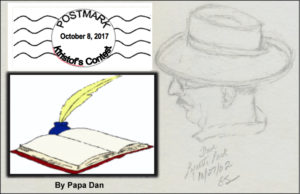
“I would like to invite you to submit entries
to a new poetry contest meant to capture
the ethos of our times in verse.
… Let’s try to examine this historical moment
through a new prism” with this poetry contest.
— Nicholas Kristof, September 15, 2017
Click here to download a PDF of this post:
Kristoff_Trump_poetry_contest_SIX_Oct_2017
= = = = = = = = = = = = = = = = = = = = = = = = = = = = = = = = = = = = = = = = = =
On September 15, Nicholas Kristof invited readers to submit entries to a new contest in the NYT — his invite: “Announcing a Trump Poetry Contest” is found at: https://kristof.blogs.nytimes.com/2017/09/15/announcing-a-trump-poetry-contest/
Below are six entries sent to the contest by two local authors:
myself and Lauren De Vore.)
Below are Dan’s three entries to Kristof’s New York Times “Trump” poetry contest.
After those are three poems submitted by Lauren De Vore. As of October 8, it is unknown if any of these six poems were selected to appear in The Times. We’ll see …
• Consistent with the topic, my intent was to reflect on a distortion of the Presidency with a distortion of the sonnet form. Like classic sonnets, my entries are written in iambic pentameter, but, unlike those others, each has 20 lines (4-7-5-4) and no rhyme, just like this Presidency.
• Another objective: to fulfill contest requirements without mentioning a certain name.
— PapaDan
= = = = = = = = = = = = = = = = = = = = = = = = = = = = = = = = = = = = = = = = = =
What This One Hasn’t Learned
By Dan Sapone
A president presides but does not claim
all triumphs and achievements for himself.
He praises goodness that we’ve all achieved
together to become the change we seek.
My Dad’s advice: “Give credit and take blame”
was offered free to any who would lead.
“Lift up the folks around you when you speak.
Say not ’I’m great’; for if you are, the world
will tell YOU so; and you can humbly say,
“It’s WE who make the world a better place,
together all,” he adds, “Unless we don’t … ”
For then, true leaders know to change the path
and say, “Together, follow me this way,
and bring with us those needing helping hands,
for hands we have; and other hands we’ll need
when harder work will be required of us.
D’yathink that HE can learn what those before
him knew and brought with them to leadership:
that greatness lies only in “Us” and “We”
and not at all alone in “I” and “Me?”
= = = = = = = = = = = = = = = = = = = = =
Dancing on the Edge at the End of the World
By Dan Sapone
Poets’ve said a lot ’bout how it ends.
Said one: “Some say in fire, some say in ice.”
Another wrote we should expect the sound
to be “a whimper” only, not “a bang.”
So, on the edge, so near the end, we dance.
We’ve grown up thinking of a sudden end
to all we’ve known — a blast, a mist, then gone.
But those who watch may notice that a slow
decline precedes the end. A lack of care,
neglect of values writ in stone by those
who came before. They warned us loud and clear:
“Take care of those who need — we’re all the same.
Become the change we seek. Beware of those
who shout the loudest, those who wish to rise
by pushing others down.” But we forgot,
and looked away, while demagogues arose.
And so we dance, here on the edge. While some
will quickly pay the price of our neglect,
it’s all of us, in time, who’ll see it end.
Yes, all of us, in time, will see it end.
= = = = = = = = = = = = = = = = = = = = =
“In a democracy people get the leaders they deserve.” — Joseph de Maistre
(popularly misquoted as having originated with Alexis de Tocqueville and Abraham Lincoln)
The Leaders We Deserve?
By Dan Sapone
A coupla hundred years ago, a few
observers offered this enduring truth,
that over time, “In a democracy,
the people get the leaders they deserve.”
That begs some questions those of us who vote
must ask ourselves: Is THIS what we deserve?
What earned us this foul-mouthed incompetent
who represents us all around the world?
Can we of right say loudly “Shame on him”
or must we own it and say, “Shame on us?”
How can we know what is it we deserve?
Do we disparage those unlike ourselves?
Or welcome others with our minds and hearts?
Do we speak of each other with respect?
Do we contribute to a common good
to help make us into a better us?”
Perhaps our leaders mindlessly reflect
the image that our honest mirror shows.
Perhaps we must admit the painful truth:
We got the leaders who are just like us.
= = = = = = = = = = = = = = = = = = = = =
Lauren de Vore’s three submissions to Nicholas Kristof’s Poetry Contest
Below are the poems Lauren submitted. In announcing the contest, Kristof asked for poems that “capture the ethos of our times” and noted that “if you can make us feel better, or laugh, or think more deeply, so much the better.” As much as I would have liked to been humorous, I do not find the current ethos to be such that verse can make anyone feel better. Rather, my poems give voice to my disgust and despair over these Trumpian times as well as the moral responsibility those of us who disagree with the current Administration and Congress have to stand in resistance and as witness to this dangerous and damaging period in our nation’s history. As for thinking more deeply, by all means do so, but not at the risk of sinking into an abyss. One must have faith in the ability to change things for the better in order to fight for the better.
Directive for the 21st Century
by Lauren de Vore
Be not numb. Turn not away. Someone must bear witness.
Hone your nerves that you may be shocked, offended,
Outraged by the sandbox-bully meanness,
By the lies and the flag-waving god-invoked hate,
That you may be horrified, anguished, incensed
In the face of act upon act of violence
And the blood-lust glee of the perpetrators.
Shrug not. Retreat not into cynicism.
Someone must feel the pain.
Though you march not on the front lines of protest
Against those who would destroy
What they envy, what they fear
And torment the weak simply because they can,
Avert not your eyes and hope it will all go away.
Rather, stand unblinking,
Witness to the rending of a nation.
And when the land lies blood-soaked and torn,
Like a troubadour of old, tell the tales of the slaughters
And the resistance, of the villains and the heroes,
That some who survive the madness may listen, may learn.
Be not numb. Turn not away. Someone must bear witness.
* Written in response to “Truth, Lies and Numbness,”by Roger Cohen, The New York Times (August 24, 2017).
= = = = = = = = = = = = = = = = = = = = =
Masquerade
by Lauren de Vore
Drivel passing as profound Sound bites
proclaimed as wisdom Bluster and bullying
ranted as righteousness Lies hustled as
truth Hatred spewed as patriotism And
bigotry cloaked in the robes of faith
Even as Tolerance is scorned Compassion
mocked Otherness reviled Restraint and
reason Spurned and derided As weakness
As foolishness and naiveté
Yet who are the naïve The foolish, the weak
But those who refuse to see This masquerade
for the farce it is And wrapping themselves
in spangles and stripes Dance on the precipice
Of our undoing
= = = = = = = = = = = = = = = = = = = = =
AWOL
by Lauren de Vore
There is no “i” in country
There is no “u” in nation
There is no peace in poverty
Or hope in homelessness
No tolerance in tea parties
No grace in zealotry
There is no trace of humbleness
In hubris, not a shred
Of decency in demagogue
What future is there for
This grand experiment that’s U.S.
When hate and blood and fear
Run rampant in the streets
When politicians sabotage
The land they claim to serve
And super-PACs buy votes and laws
To feed their appetite for ever more
When body politic prides ignorance
And presidents toss covfefe
Into the swirling winds
But there’s an “I” in nation, “you” in country too
Perhaps one day the “S of A” will find again its “U”
= = = = = = = = = = = = = = = = = = = = =
Snow Globe
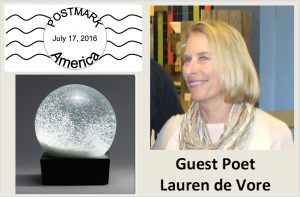
I read the news this morning. Yet another shooting, this time, police ambushed in Baton Rouge. Even as my heart wrenched, my cynical (benumbed?) mind wondered what it would be tomorrow—civilian or law enforcement? terrorist or home-grown? individual or mass? As horrid as these events are, we must bear witness to them. We must talk. We must act. Otherwise, nothing changes.
====================================================================
Snow Globe
A shot, a siren.
A siren, a shot.
Does it matter which is first?
Either way someone’s dead.
One life ended,
Others destroyed—
The shot, the shooter,
Those left behind.
The act, the image.
The image, the outrage.
Marches, protests,
Funerals.
Pulpits, airwaves
Fill with eloquence,
Prayers and pleas
And vows for change.
Yet where’s the outrage
When nothing changes?
Black skin, brown skin,
White skin, tan,
Blue jeans, badge,
Crescent, cross, six-point star.
Does it matter who bleeds first?
Either way blood is spilt,
Hands are stained,
Souls are rended.
Vengeance, justice,
Someone tell me,
What’s the difference?
Shake a snow globe,
Glittering flakes in fury swirl,
Slacken, then subside.
A shot, a siren.
A siren, a shot.
Yet again a life is ended.
Yet again the globe’s upended.
Yet again nothing changes.
(Lauren de Vore, July 17, 2016)
Download “Snow Globe” in PDF: ConVivio_Snow_Globe_DeVore_7_17_2016
Guest Poet: Lauren de Vore, National Poetry Month 2015 Continues . . .
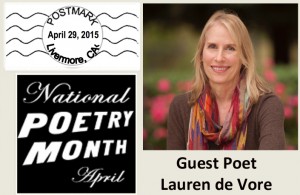 Well, this is a completely new experience for me, a coming out of my poet’s closet so to speak. After spending my working years as a science writer/technical editor, it’s a real treat now to spend time writing what I want to write! To my surprise, I find myself writing poetry.
Well, this is a completely new experience for me, a coming out of my poet’s closet so to speak. After spending my working years as a science writer/technical editor, it’s a real treat now to spend time writing what I want to write! To my surprise, I find myself writing poetry.
I’ve always loved the sound and rhythm of words, and some of my earliest memories are of being read to—fairy tales, classic children’s stories, and poems, lots and lots of poems. Remember “Lines on the Antiquity of Microbes” (subtitled “Fleas” by Strickland Gillilan): “Adam/Had ‘em.”, reputedly the shortest poem ever published? Or how about the hypnotic verses of Robert Service: “There are strange things done in the midnight sun by the men who moil for gold…”?
As I found pleasure in the writing of the following poems, I hope you find pleasure reading them.
==================== Click here for a PDF of this post: ConVivio Guest Post ldv r2
Like Dan, I love Yosemite. As spectacular as spring and early summer can be, fall is actually my favorite time there; the days are still warm but the nights are crisp and, with the crowds gone, the valley is quietly settling down for the winter. Regardless of season, there is something spiritual about the place. I wrote the following poem last June after an early morning walk.
Morning Walk
Lauren de Vore (July 3, 2014)
I rose at dawn one summer morn
Something was calling me
A gift to see the day new born
Here in Yosemite
The forest duff held yestreen’s heat
Meadow grass bowed with dew
I watched the silent stars retreat
Dark eased its sable hue
With reverence I inhaled deep
All was hushed, nothing stirred
So perfect, pure that I could weep
Silver song of first bird
Such sanctity in every rock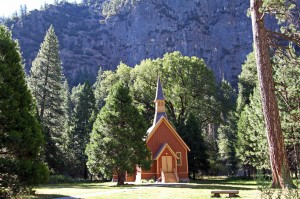
Waterfall river pool
All mysteries reveal, unlock
Here in God’s vestibule
I walked till gray gave way to light
Granite in bas-relief
A simple chapel met my sight
Edifice for belief
Seems strange that midst this majesty
Man constructs walls and roof
In searching for divinity
Indoors he turns for proof
Perhaps too much to face full-blazed
Unfiltered gaze of God
Within a structure man has raised
There finds it safe to laud
A gentle breeze whispered my way
Gratia domini
Whate’er the day it’s Sabbath day
Here in Yosemite
===================
I’ve long been a fan of Walt Whitman, even before I went to Whitman College. And no, the college was not named for the poet but for a missionary, Marcus Whitman, who in settling the Walla Walla valley managed to wipe out most of the native inhabitants with a measles epidemic; the understandably irate survivors then massacred Marcus and his settlers. History lesson aside, do you remember Apple’s commercial for last year’s Superbowl, “…the powerful play goes on, and you may contribute a verse.”? That’s a line from the poem “O Me! O Life!” (http://www.poetryfoundation.org/poem/182088) in Whitman’s “Leaves of Grass.”
My verse is below. I think everyone, at some point or another, contemplates legacy. Very few of us have the opportunity, talent and/or fortitude to make a difference in the grand scheme of things. But on the smaller, more human scale…
My Verse
Lauren de Vore (Feb 27, 2014)
My verse, Mr. Whitman,
Is but a small verse, a simple verse,
One of quiet striving to find a place to fit in,
A way to leave the world better, if only a bit, than before.
I have asked the larger questions but only lightly,
For I am one more inclined to nurture dragons than slay them;
I have loved well but without grand passion,
For I am better suited to live on the plains, in the lea not the face of the storm;
I have shed tears over the struggle and injustice,
But cried also over the beauty and sheer joy of it all.
Many are the times I should have done, could have done,
But more are the times I did.
And so, mine is a simple verse—a son, a handful of friends,
A smattering of follies and kindnesses, of ordinary tragedies and triumphs.
I have not shaken the earth for good or ill,
But I have lived. I am here.
====================
Since we’re recognizing National Poetry Month, here are several poems about words, poets and poetry. There’s a lot of verbiage about poetry being transcendent, sublime, profound, etc. I’m always a bit put off by these superlatives. Some poetry is indeed extraordinary and inspiring, and I suspect many poets have ambitions toward that end. But such characterizations can make poetry seem intimidating and set it beyond the ken and interest of ordinary writers and readers. It’s important to remember that poetry is also fun, and that less-than profound poems are every bit as valuable, and often more enjoyable, than the critically acclaimed “greats.”
====================
This is my little rebuttal to literary critics who extol poetry in highfalutin terms and to poets who cultivate the abstruse in an attempt to be profound. As an aside, I’m very fond of sonnets. I like the challenge of working within the constraints of the sonnet’s structure, meter and rhyme—specifically, 14 lines consisting of three quatrains and a concluding couplet in iambic pentameter with an ABAB or ABBA rhyming scheme. (If you’ve ever taken a music theory class, writing a sonnet is similar to being presented with the melody line and figured bass for a Bach chorale and working to fill in the other three parts. And then, of course, comes the lesson in humility when, after hours of struggle on your own composition, Bach’s version is revealed! The same thing happens when I read Shakespeare’s sonnets.)
Thoughts Profound
Lauren de Vore (Apr. 10, 2014)
The poet’s task can be formidable
For if one’s aim is poetry profound,
One must, as precedent, think thoughts profound
(Though not completely inexplicable).
But if a thought seems deep or sage to me,
I wonder is it so? Perhaps it’s just
My ignorance, something that’s been discussed
And shelved long since by those more scholarly.
But then I think, ne’er mind those dusty tomes,
Th’idea’s new to me. And so I pense
The thoughts and images as they make sense
To me, and in the process pen my poems.
I think it matters not what’s deemed profound,
But that one thinks and ventures to expound.
====================
Standing in the shower, hot water streaming over my shoulders, is often a creative time for me. Possibilities for new poems emerge, solutions to difficulties with in-progress poems arise. But then, dripping wet, I have to quickly find something to scribble on before the ideas evaporate with the steam!
Musing
Lauren de Vore (Feb. 19, 2014)
Why is it that when inspiration strikes,
I’m always in the shower or in bed
Near sleep with naught to write upon to catch
Those fleeting sparks of wit, those crystal drops
Of insight evanescent in the light
Of day? Perhaps there is some muse who likes
To tease, to pendulate a slender thread
Of perfect prose or rhyme sublime, then snatch
It back while laughing from the mountaintops.
Yet if these tricks amuse the muse, no spite
I’ll hold, for any hint poetic psyches
Me up and sets thoughts spinning in my head.
Come morn, with pen in hand I’ll chicken-scratch
Till phrases coalesce in starts and stops,
Like smoke rings that shine brightly then take flight.
And though I might prefer some clearer spikes
Of inspiration, mileage posts instead
Of traces drawn by bits of straw and thatch,
I welcome any literary sops
That come my way. For I know when the right
Words finally align in proper queues,
The poem belongs to me and not the muse.
====================
Words are like people. Some are practical and purposeful. Some are demanding and ambitious or exuberant and frivolous. Others are somber and melancholy or perhaps persnickety and precise. And playing with them is just plain fun.
Old Friends
Lauren de Vore (June 14, 2014)
One of the nicest things now I have time to write
Is chance to reacquaint myself with long-lost friends.
In searching for the perfect phrase or rhyme just right
As thought in prose or poem sinuously wends
Its way from brain to page, I’ve happened on a host
Of lovely words I met, oh, years ago, but long
Forgot midst press of workday life. So here’s a toast
To all the vocables that make a language song,
An art, a mental exercise, a game of tones.
Some are celebrities, imposing cynosures
That daunt for fear their inept use engender groans.
Others inveigle as they dangle sapid lures
To those who strive to find t’exact mot juste
As anodyne for verbal hebetude. The twee
And chary, risible and coy’ve returned to roost
Within my newly ‘larged vocabulology,
And in their company I’ve wambled far and wide
Through literary dingle, kloof and weald. Although
At times I balter in their syllables, beside
Their usual kith and kin they’re far more apropos
And much more fun to know. And so I set myself
The goal each day to use at least one quirky word
That else would molder on some dusty reference shelf.
Eyebrows may rise and people think me most absurd,
But words unused are eas’ly lost, and in their loss
Is language dimmed, for words are more than letters in
A row but filled with meme and meaning stretched across
The years. When words are lost, the concepts held within
Are also lost and soon or late th’ability
To think those thoughts recedes beyond recall. And so
My game of tones is more than vain legerity
But quest to save the tools we need to think and know
And understand. And after all, these words are friends,
And friendship true perdures despite mere fads and trends.
====================
I was always the nerdy kid, the one with glasses and braces who actually liked school and read poetry even when it wasn’t assigned. In fact, one of my favorite poems was (and still is) Robert Browning’s “The Bishop Orders his Tomb at Saint Praxed’s Church” (http://www.poetryfoundation.org/poem/173002). On a recent rereading, it struck me how much one’s enjoyment of such poems depends on knowledge of the “cultural literacy” of the era in which the poem was written. The verse below attempts to reflect on this realization.
A Poet’s Admonition
Lauren de Vore (Dec. 6, 2013)
A passing survey of lauded poets of yore
Reveals what may be a vexing predicament
For would-be bards of today, for tis evident
That the sonnets and odes English teachers adore
Are brimming with analogies from history,
Legend and myth. These allusionary subjects,
While once in common grasp, now baffle and perplex
All but the super-erudite and scholarly.
For who today knows ‘nough of Ozymandias
Or Cuchulain or Lochinvar to apprehend
The poet’s nuance? Be they villain or godsend,
Their deeds are lost to time, their names are powerless.
Thus must the twenty-first-century poet ask,
What is the current coin of history and myth,
The people and places that will register with
Readers today and in years to come? Quite a task
To choose amongst Lincoln, Mandela, or Gandhi,
‘Twixt Birkenau and Abu Ghraib. And which of these,
If any, will have meaning in the centuries
Ahead when poet too is part of history?
No matter how important now, most everyone
And every deed will likely be forgot in time
As memory must pick and choose which are sublime
And worth remembering, the rest to jettison.
Perhaps this is the poet’s task, to search the dross
And find the diamonds bright, and by the craft transform
Mere mortals into myth.
Mere mortals into myth . Bard choose well, for you form
The future’s view of history, a heavy cross
Indeed to bear. But every age has need of lore,
And hist’ry books though filled with facts are dreary works.
But stories tell with rhythm and with rhyming verse,
And oft the parables evolve to something more.
So poet hone your tales and wisely wield your pen,
For they may well have powers far beyond your ken.
====================
These next two poems started out simply as observations of scenes but evolved into something a bit more.
Big Sur Coast
Lauren de Vore (Feb. 24, 2015)
On high I watch the breakers pound the shore.
With foaming wrath they protest journey’s end,
As if through sound and fury they could rend
The cliffs and force the land to yield before
Their watery might. No restful overlook
This bluff of mine, with naught for company
But screaming gulls and one lone cypress tree.
Though meager shelter ‘gainst the wind, in crook
Of twisted trunk I stand, eyes squinting in
The glare. With every thundering crash I feel
The temper in each surge of liquid steel,
Frustration that the race is run and win
Or lose ‘tis done. Thus so I reckon feels
The river as it empties in the sea,
As well th’explorer trekking westerly
Till dry land ends and squatting on his heels
Curses the ocean now his westering days
Are done. And yet the rivers ever run,
And though the strand is strewn with those who shun
The sea’s untamed expanse, the restless gaze
Beyond the known and venture ever on.
Around the globe, by tempests tossed, by ice
And fire burned, be’t hell or paradise
They tarry not as onwards they are drawn.
And when at last the last frontier’s been breached,
When all the empty lands are overrun,
What of the ones who chase the setting sun,
Now that the questing’s done, the limit’s reached?
I watch the breakers crash upon the shore
Refusing to accept that journeys end.
As daylight fades, down from my bluff I wend
And know the waves will pound forevermore.
====================
I’m convinced that all cats, just before they are born, are sworn to secrecy about all things feline!
Cat
Lauren de Vore (April 15, 2015)
So sleek and elegant, tuxedo-clad, my cat
Sits crouched upon the hearth and stares unblinking at
The dancing flames and glowing coals. What see you there,
Oh cat who deigns to share my bed and meager fare,
Deep in the fire’s heart? Across the eons do
You gaze, when deepest darkest Africa was new,
When mighty beasts, not man, did rule the plains and you
Perhaps the leader of some simban pride? Or do
You see the ancient pyramids when cats were viewed
As gods, were worshipped, idolized, their favors wooed?
Can you tap mem’ries from the days beyond recall?
You’ve prowled the fetid alleys and the king’s great hall
As Black Death carried off both rich and poor. You’ve sailed
Around the world, in countless armies’ van you’ve trailed,
You’ve watched as tempests swirled and battles raged and seen
The course of hist’ry changed. Oh cat of midnight sheen,
The flick’ring flames reflect within your slitted eyes,
Their ever-changing scintillations hypnotize.
Can you not give me just a hint of what you see,
Of all that’s feline, foreign and thus hid from me?
Still as a statue, full of secrets, staring at
The swirling fire, so sits my sleek and silent cat.
====================
Every writer is, I suspect, an avid reader—a good thing too, since where would writers be without readers?
Selfish
Lauren de Vore (Jan. 6, 2014)
My reading time is precious time, my selfish time.
So if you see me with a book, don’t talk to me,
Don’t ask me what I’m doing—reading, duh—or if
It’s good—it is, I wouldn’t read it otherwise.
And if you do, don’t be surprised or captious when
I scowl as I reluctantly reply. And should
You then decide to choose a book or magazine
Yourself to read, please be forewarned that reading’s not
A group activity. Repress, nay kill the urge
To interrupt to ask to read me “just one thing.”
Though I may acquiesce with barely stifled sigh,
The answer’s really “no.” For I am far away
Within the pages of my book—another time,
Another place—and hauling back to here and now
Is maddening beyond belief. Tis selfish, true,
Such solitude to seek and churlish to resent
Its breach. But since I have no secret place in which
To hide away and read, domestic bliss would be
Enhanced by silence till I’ve closed my book and joined
Again the present day and ever-patient spouse.
===================
And finally a little something haiku-ish…
Birdsong in a minor key
Shatters the fragile shell of dawn.
Daybreak.
Many thanks to my husband, Paul Jackson, for the photos. (You should have an exhibit some day!)
— Lauren de Vore
Celebrating National Poetry Month — Welcome Back to ConVivio
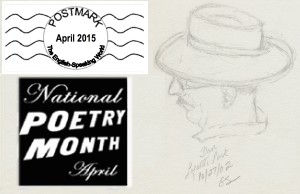 OK, so National Poetry Month is as good an excuse as any to welcome you back to ConVivio —
OK, so National Poetry Month is as good an excuse as any to welcome you back to ConVivio —
Welcome back! It’s been awhile. How’ve you been? Some of you with long memories may remember that I started this blog around harvest time in 2009, and named it after our little amateur winery. In Italian, ConVivio means “festival.” In English, it derives from words like welcoming, friendly, lively, and hospitable — literally “with life.” I began this experiment in storytelling to celebrate all things related to that broad theme. Our media include fiction, non-fiction, poetry, art, travel, music, food, and wine — in no particular order. Today, we re-introduce ConVivio in honor of National Poetry Month, just as we did five years ago this month, with a handful of poems. Even though my own writing is mostly prose, I have long been an admirer of poetry and poetic language. I would like to dispel the notion that poetry is somehow an old, dead art, forced on young people by vengeful English teachers to build character through suffering. I assert that poetry is alive and well and found giving pleasure in a number of places in popular culture. Some of our best known writers of prose are also purveyors of artful language.
The poems I offer today have at least one thing on common — each was written in response to another ‘work of art.’ I include my own unspectacular attempts at poetry and those of a few much more accomplished living poets. You are welcome to participate today, and in the future, by reading what you find here and, if you feel the urge, responding with your own comments and contributions, using the “comments” field at the end of each post. We hope you will join us here often.
============================
A Local Tri-Valley Poet: Lauren de Vore
Since we’re honoring National Poetry Month, it seems appropriate to start with “what is poetry?” Contrary to what some may think, poetry is not an archaic genre or something forced on schoolchildren to inflict pain. Rather poetry is for everyman and by everyman, as relevant today as in the time of Homer and before. As Lauren says…
Poetry Is
by Lauren de Vore (April 14, 2015)
Poetry is a song Poetry is outrage
Where the words themselves For times when prose
Make the music. Is insufficient.
Poetry is a painting Poetry is passion
By hands inept In all its excess
With pigment and brush. And abandon.
Poetry is a love letter Poetry is laughter
For a heart too shy For the simple joys
To speak the words. Of everyday life.
Poetry is the pulse Poetry is crystal
Of memory Pure and transparent
Echoing round the fire. As clear water.
Poetry is a rainbow Poetry is profound
Of dreams tinted Fathomless and dark
With rhythm and rhyme. As the human soul.
Poetry is a prayer Poetry is ageless
Where the poet cries Timeless for as long
Out to his god. As man has words.
This is whiter space without any text at all Poetry is.
============================
Next is a poem I started to write while Gretta and I were sitting in Bryant Park in midtown Manhattan and finished a few blocks away in the lobby of the Algonquin Hotel (where much greater writers did their work in times gone by). What struck me most about Bryant Park was its rhythm — and island of green at the center of the world’s most intense city. This poem is inspired by the rhythm of another poem (OK, a song lyric) by Antonio Carlos Jobim. So, it is truly a response to two other works of art: Jobim’s Waters of March (copied below my poem for your comparison) and Bryant Park itself — a work of urban art on a large scale. It is an experiment in rhythm and image.
Bryant Park: An Island of New York Rhythms Amid the Tall City
By Dan Sapone
Rhythmic inspiration provided by Antonio Carlos Jobim (see below)
A step
outside
both ways to the park
past the guys playing chess
until long after dark.
And the park is alive with the young and the old
reading books on iPads eating ice cream that’s sold . . .
right here
right now
‘mid the tall glass and steel,
‘round this island of green,
where the jugglers are real.
To see and be seen all four classes are there:
Low, middle, and high, and “I don’t really care.”
A beer
A dog
And some ‘kraut on a roll
with a pickle and chips
it’s all food for the soul.
Oh, there’s nori on sushi, and wasabi peas
Chorizo, chipotle, chiabata, and cheese.
Bizz-ness,
all kinds,
being done all around
selling personal jets
and some stuff on the ground.
And the rhythm of now is as old as the land;
it’s as new as the kids playing marbles in sand.
Non-stop
You hear
Varied sounds of the day.
It’s a city at work.
It’s a city at play.
Taxis, busses, and bikes’ polyphonic cacophony,
plays a twenty-first-century version of harmony.
Destination, way station, place to go and to be,
here together alone, plugged in cordlessly.
At night
Gets dark?
No, no, not at all,
For the bright-lit skyscrapers
Shine down on us all.
It changes from everyone’s front porch and yard,
To comf’terble living room with ceiling that’s starred.
It’s here; it’s now; it’s there; it’s then.
And the change ev’ry hour brings us back again . . .
Why here?
Why now?
Are we looking inside?
Or escaping a burden
in plain sight to hide?
In the world spinning faster and faster each day,
We ask, “Will it carry us near or away?”
Our park answers softly, “You can stay just right here.
I’m not changing, honest, you’ve nothing to fear.”
============================
In 2001, “Águas de Março” was named as the all-time best Brazilian song in a poll of Brazilian journalists, musicians and other artists. The central metaphor of The Waters of March gives the impression of the passing of daily life and its progression towards death, just as the rains of March mark the end of a Brazilian summer. But, the translated lyrics speak of “the promise of life,” “the joy in your heart,” and the “promise of spring,” suggesting a much more affirming theme. [iTunes will bring Jane Monheit’s wonderful performance of this song to your iPhone for ninety-nine cents.]
The Waters of March
By Antonio Carlos Jobim
A stick,
a stone,
it’s the end of the road,
It’s the rest of a stump,
it’s a little alone.
It’s a sliver of glass, it is life, it’s the sun
It is night, it is death, it’s a trap, it’s a gun.
The oak when it blooms,
a fox in the brush,
the knot in the wood,
the song of a thrush.
The will of the wind, a cliff, a fall
A scratch, a lump, it is nothing at all.
It’s the wind blowing free,
it’s the end of the slope.
It’s a beam, it’s a void,
it’s a hunch, it’s a hope
And the riverbank talks of the waters of March
It’s the end of all strain, it’s the joy in your heart.
The foot,
the ground,
the flesh and the bone
The beat of the road, a slingshot’s stone.
A fish, a flash, a silvery glow
A fight, a bet, the range of a bow.
The bed of the well, the end of the line,
The dismay in the face, it’s a loss, it’s a find.
A spear, a spike, a point, a nail
A drip, a drop, the end of the tale.
A truckload of bricks in the soft morning light
The sound of a shot in the dead of the night
A mile, a must, a thrust, a bump,
It’s a girl, it’s a rhyme, it’s a cold, it’s the mumps.
The plan of the house, the body in bed
And the car that got stuck, it’s the mud, it’s the mud.
A float, a drift,
a flight, a wing
A hawk, a quail,
the promise of spring.
And the riverbank talks of the waters of March
It’s the promise of life, it’s the joy in your heart.
A snake,
a stick,
it is John, it is Joe,
It’s a thorn on your hand and a cut in your toe.
A point, a grain, a bee, a bite
A blink, a buzzard, a sudden stroke of night.
A pin,
a needle,
a sting, a pain
A snail, a riddle, a wasp or a stain.
A pass in the mountains, a horse and a mule
In the distance the shelves rode three shadows of blue.
And the river bank talks of the waters of March
It’s the promise of life in your heart, in your heart.
A stick, a stone, the end of the road,
The rest of a stump, a lonesome road.
A sliver of glass, a life, the sun,
A knife, a death, the end of the run.
And the river bank talks of the waters of March
It’s the end of all strain, it’s the joy in your heart.
==================
Inspiration from The Lady in the Harbor
Lauren wrote this poem in response to two other works of art: Emma Lazarus’ famous 1883 poem The New Colossus (copied below this one), and the colossal work of art that inspired that poem, The Statue of Liberty, in New York Harbor.
Cry Shame
By Lauren de Vore (September 5, 2014)
I. Hypocrisy
Not like Ms. Liberty whose outstretched hand
And flaming torch did bid world-wide welcome
To exiles seeking sanctuary from
Injustice in their far-off native land,
A barrier in fact and mind’s been built
Against newcomers yearning to breathe free.
Whence came such coldness and hypocrisy?
Have we forgotten all the blood t’was spilt
For freedom’s sake on foreign shores that would
Deny such liberation here at home?
I fear America is passing into gloam
When we forget for what this country stood.
A travesty, the border fence doth shout
“You homeless, poor, and tempest-tost—keep out!”
II. Truths Self-Evident
How short and fickle is the memory
Of those who’d shut this country’s golden door,
And in the closing guilefully ignore
That not so long ago t’was they, t’was we
Who were the immigrants. For then, as now,
The hunger for a better life didst drive
Us all to seek a place where we could thrive,
A land where founding fathers did avow
As truths self-evident that all men are
Created equal, with God-given right
To life and liberty and chance to fight
For happiness ‘neath freedom’s beacon star.
That which was true for generations past
Still’s true for all the wretched and outcast.
III. Cry Shame
Cry shame on all false patriots, on all
Who smirch their heritage fear-mongering
‘Gainst incomers with nonwhite skin, who sling
Their vitriol on any who’d forestall
Such bigotry. There is no honor in
A land that claims to champion liberty
Yet fences out th’oppressed, that piously
Hides prejudice behind flag-waving din.
Who dares’t forget this country’s built upon
The blood and backs of immigrants? They are
Our past, they are our future too, they are
America. If welcome be withdrawn,
Our day will dim, our greatness fade away
Unless Ms. Liberty re-light our way.
==================
And here is the original, when times were different . . .
The New Colossus
By Emma Lazarus (1883)
Not like the brazen giant of Greek fame,
With conquering limbs astride from land to land;
Here at our sea-washed, sunset gates shall stand
A mighty woman with a torch, whose flame
Is the imprisoned lightning, and her name
Mother of Exiles. From her beacon-hand
Glows world-wide welcome; her mild eyes command
The air-bridged harbor that twin cities frame.
“Keep, ancient lands, your storied pomp!” cries she
With silent lips. “Give me your tired, your poor,
Your huddled masses yearning to breathe free,
The wretched refuse of your teeming shore.
Send these, the homeless, tempest-tost to me,
I lift my lamp beside the golden door!”
==================
This next poem, was inspired by a painting Gretta and I discovered in a hotel lobby in Philadelphia on our way to the patio at the back of the hotel beside the river. Walking into the hotel for the first time, the painting called Figures In a Boat by a local artist, caught my attention and made me ask, “What’s the story?” I recorded that first impression in the first part of the poem (“First Look”). At the end of the afternoon, walking back through the lobby past the painting again, it made a different impression, recorded in “Second Look.” THEN, after I sent a copy of the poem and the photo to my nephew Joseph Faletti, he reported that he saw it an entirely different way. His poem, A Different Look, is copied below mine. Joe Faletti is not a poet, or so he says. But as a programmer and software designer he is quite accustomed to making ideas to fit within a predetermined framework. So given the topic and structure he saw in First Look, Second Look, he was able to fit words for the different vision he saw in reaction to what I had seen. He also grew up with an artistic sensibility for the harmonious merger of words, images, and powerful feelings.
First Look
By Dan Sapone (October 2013)
Not alone Here
Accompanied only by responsibility For the one with all the burden
on a wine-dark sea, no oar propels nor rudder guides.
before a fearful scene, Mercy, we must hope, resides in other hands
she stands, and looks, and wonders. if it lives at all.
Here Now
The sea below and sky above No wave nor tide nor wind-filled sail
do not meet with usual grace. moves us anywhere but here.
Between the two, But where to go?
the horizon burns Where is home?
with violence and anger. Were we transported here for safety?
There Or did we drift here into danger?
Do the flames a homeland burn? Was it inattention, mindful negligence, or trust,
Whose? Mine? that brought us here?
An unintended consequence in pursuit of warmth?
Or did someone choose to burn it down, And I
a preferred replacement to install? Sleeping on a steady shoulder
Will the sea between us and danger knowing none of this,
quench the flames can only sleep
us carry safely to a calmer port to wake into whatever destination
or to destruction? that awaits.
Second Look
By Dan Sapone
Alone Here
Accompanied only by the future The one who holds the promise
on hopeful waters, Needs no oar nor rudder to arrive.
before a welcome dawn, Welcome, we learn, resides in other hands
she stands, and looks, and knows. Stretched out to us.
Here Now
Stars that ruled the night An ebbing tide is all it takes
are washed away by a warming sun. to draw us home on well-lit waters
The sky and sea, alike in darkness, Lest we drift away to danger,
conspire to reveal a destination must it be earned
ripe with promise, as the light ascends. through attention, vigilance, and trust
There that brought us here?
Does home await in this morning light? And I
Theirs? And now mine, ours? Sleeping on a steady shoulder
Will the light that brought them here Knowing none of this,
give sight as well to other eyes. can only sleep
What did they offer? to wake into whatever destination
What do we? that awaits.
A Different Look
By Joe Faletti (inspired by First Look, Second Look by Dan Sapone)
Part of a chain
Filled with relief – and awe,
on a wind-swept lake,
as the never-old dawn diffuses through the fog;
he absorbs the moment, and the tossings as of the boat
and is content.
Here
His father taught him to fish here,
arising in darkness to paddle into moonlight.
And to love the water, and the quiet,
and the soft, steady, yet random undulation
and the arrival of dawn –
time to return to land and breakfast.
And perhaps a nap!
There
The wife and mother sleeps in comfort,
secure in the knowing that all is well,
because all is quiet.
Or is she still uneasy —
unable to rest completely,
sensing the half-empty bed
and the empty crib nearby.
Here
The new father sighs at his success
in comforting a colicky child
less desperately than driving the pitted lake road.
And revels in the warm cushion
of a sleeping child, breathing quietly
beside his ear.
Now
One task remains,
more daunting than the recent triumph:
To row back to the dock,
climb the ladder,
and place the baby in a waiting crib,
without disturbing its sleep.
Perhaps he’ll stay
and watch the sun rise a bit longer!
And I
Relaxed and secure in his strong hold,
knowing none of this,
can only sleep
and dream of past and present.
=========================
Of course, many of us — certainly of my generation — have experienced poetry in song lyrics almost more than any other way. I would be remiss if I didn’t acknowledge National Poetry Month without one especially poetic song. Again, this one is a poem written in response to another work of art and its artist, Vincent Van Gogh.
Vincent (Starry, Starry Night)
by Don McLean (inspired by Starry Night by Vincent Van Gogh)
Paint your palette blue and gray
Look out on a summer’s day
With eyes that know the darkness in my soul.
Shadows on the hills
Sketch the trees and the daffodils
Catch the breeze and the winter chills
In colors on the snowy linen land.
This is a blank line
Now I understand
What you tried to say to me
And how you suffered for your sanity
And how you tried to set them free.
They would not listen, they did not know how
Perhaps they’ll listen now.
This is a blank line
Starry, starry night
Flaming flowers that brightly blaze
Swirling clouds in violet haze
Reflect in Vincent’s eyes of china blue
Colors changing hue.
Morning fields of amber grain
Weathered faces lined in pain
Are soothed beneath the artist’s loving hand.
This is a blank line
Now I understand
What you tried to say to me
And how you suffered for your sanity
And how you tried to set them free.
They would not listen, they did not know how
Perhaps they’ll listen now.
This is a blank line
For they could not love you
But still your love was true
And when no hope was left in sight
On that starry, starry night,
You took your life, as lovers often do.
But I could’ve told you, Vincent,
This world was never meant for
One as beautiful as you.
This is a blank line
Starry, starry night
Portraits hung in empty halls
Frame-less heads on nameless walls
With eyes that watch the world and can’t forget
Like the strangers that you’ve met.
The ragged men in ragged clothes
The silver thorn of bloody rose
Lie crushed and broken on the virgin snow.
This is a blank line e
Now I think I know
What you tried to say to me
And how you suffered for your sanity
And how you tried to set them free
They would not listen, they’re not listening still
Perhaps they never will.
===========================
A Pentameter Fistfight Between Iambs (u /) and Trochees (/ u)
by Dan Sapone (2014)
And now something ridiculous for those who remember, from freshman English class, being taught about the strategic use of iambic pentameter vs trochaic pentameter (right, I’m talking about you). It is poetry making fun of itself — because — poetry is supposed to be fun. [Sorry about the blurry image — ain’t technology grand?]
===========================
Our last poem is another by our own local poet, Lauren de Vore. It’s a bit of a teaser — in two weeks, ConVivio will feature an entire post featuring a set of Lauren’s poems. This one is written in the classic sonnet form —about sonnets . . . well sort of.
Poetical Tweets
Sententious and obscure, archaic with
It’s prejudice ‘gainst feet trochaic, curse
Of students forced to parse the poet’s pith.
One hundred forty syllables is all,
Three quatrains and a couplet short and sweet,
Profane, profound or scribbling on a wall.
A free-for-all. The art is knowing when
To bend or break the rules as best befits
The poet’s vision and the poem’s zen.
Tweet sonnets from the subways and sidewalks.
Well, I hope you enjoyed this little tribute to National Poetry Month. If you got this far, let us know what you think.
Although I don’t agree with everything in the articles below, if you’d like some further reading: try this:
http://www.huffingtonpost.com/pam-allyn/why-poetry-matters_b_5185399.html
Or this: http://www.edgemagazine.net/2012/08/why-poetry-matters/
–> Next week: look for a piece of prose — this time a column about the place that Gretta and I have decided is our favorite place in all the world.
Regards — PapaDan
National Poetry Month Ends: Happy Birthday, Will Shakespeare!
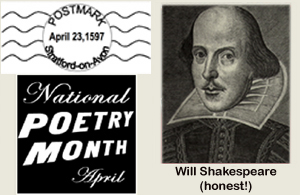 In honor of the birthday (April 23) of the world’s greatest poet and playwright, we add to our month-long poetry reading what some consider the greatest pair of love poems in the language.
In honor of the birthday (April 23) of the world’s greatest poet and playwright, we add to our month-long poetry reading what some consider the greatest pair of love poems in the language.
Romeo speaks first as he looks up at Juliet’s balcony and catches a glimpse of her as she laments the unfairness of falling in love with a boy whose family is the sworn enemy of her family. Meanwhile, he thinks about how nice it would be to touch her cheek (but he says it nicely, for a guy . . . ).
Then, she speaks some widely misunderstood lines, wondering WHY (remember, “wherefore” = “why”) WHY he is Romeo? WHY he must be a Montague? She also wonders why he wouldn’t be willing to solve the problem by giving up his name, since she is willing to give up hers (a legitimate question, eh?).
ROMEO AND JULIET
Act 2, Scene 2
ROMEO
But, soft! what light through yonder window breaks?
It is the east, and Juliet is the sun.
Arise, fair sun, and kill the envious moon,
Who is already sick and pale with grief,
That thou her maid art far more fair than she:
Be not her maid, since she is envious;
Her vestal livery is but sick and green
And none but fools do wear it; cast it off.
It is my lady, O, it is my love!
O, that she knew she were!
She speaks yet she says nothing: what of that?
Her eye discourses; I will answer it.
I am too bold, ’tis not to me she speaks:
Two of the fairest stars in all the heaven,
Having some business, do entreat her eyes
To twinkle in their spheres till they return.
What if her eyes were there, they in her head?
The brightness of her cheek would shame those stars,
As daylight doth a lamp; her eyes in heaven
Would through the airy region stream so bright
That birds would sing and think it were not night.
See, how she leans her cheek upon her hand!
O, that I were a glove upon that hand,
That I might touch that cheek!
JULIET
Ay me!
ROMEO
She speaks:
O, speak again, bright angel! for thou art
As glorious to this night, being o’er my head
As is a winged messenger of heaven
Unto the white-upturned wondering eyes
Of mortals that fall back to gaze on him
When he bestrides the lazy-pacing clouds
And sails upon the bosom of the air.
JULIET
O Romeo, Romeo! wherefore art thou Romeo?
Deny thy father and refuse thy name
Or, if thou wilt not, be but sworn my love,
And I’ll no longer be a Capulet.
ROMEO
[Aside] Shall I hear more, or shall I speak at this?
JULIET
‘Tis but thy name that is my enemy;
Thou art thyself, though not a Montague.
What’s Montague? it is nor hand, nor foot,
Nor arm, nor face, nor any other part
Belonging to a man. O, be some other name!
What’s in a name? that which we call a rose
By any other name would smell as sweet;
So Romeo would, were he not Romeo call’d,
Retain that dear perfection which he owes
Without that title. Romeo, doff thy name,
And for that name which is no part of thee
Take all myself.
=================================
Preview of Coming Attractions
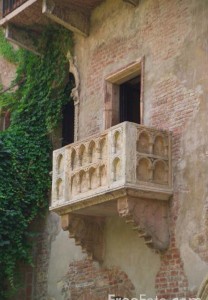 In June, Gretta and I plan to drop by and visit this balcony in Verona, which the locals claim is THE balcony in this famous scene. William Shakespeare, son of John Shakespeare, never visited Verona; but his characters do have some pretty impressive Veronese roots. In 1597, when Shakespeare wrote Romeo & Juliet, Luigi Da Porta’s 1530 story of Romeo Montecchi and Giulietta Cappelletti (names taken from Dante’s Purgatorio) was fairly well known to many of Shakespeare’s contemporaries, as were other published versions by Bandello (1554) and The Tragicall Historye of Romeus and Juliett (1562) attributed to Arthur Brooke. Events in the play have caused some to make connections to real characters and events (including an earthquake in Italy in 1570 and a duel in 1581 with familiar details). All of this has led to conspiracy theories questioning Shakespeare’s authorship.
In June, Gretta and I plan to drop by and visit this balcony in Verona, which the locals claim is THE balcony in this famous scene. William Shakespeare, son of John Shakespeare, never visited Verona; but his characters do have some pretty impressive Veronese roots. In 1597, when Shakespeare wrote Romeo & Juliet, Luigi Da Porta’s 1530 story of Romeo Montecchi and Giulietta Cappelletti (names taken from Dante’s Purgatorio) was fairly well known to many of Shakespeare’s contemporaries, as were other published versions by Bandello (1554) and The Tragicall Historye of Romeus and Juliett (1562) attributed to Arthur Brooke. Events in the play have caused some to make connections to real characters and events (including an earthquake in Italy in 1570 and a duel in 1581 with familiar details). All of this has led to conspiracy theories questioning Shakespeare’s authorship.
I, of course, am convinced that Shakespeare wrote this play (and others set in Italy) from stories told to him by travelers (perhaps Christopher Marlowe) who had visited Verona. I have been, so far, unconvinced that Christopher Marlowe escaped from a deadly scandal by faking his own death and emerging in London as William Shakespeare and suddenly becoming the greatest poet and playwright of all time. However, I am about the read James Shapiro’s new book Contested Will: Who Wrote Shakespeare?, which focuses on this subject; so, I’ll get back to you on that . . . Perhaps standing beneath “Juliet’s” balcony, the truth will emerge.
=================
One more
This is my last post in honor of National Poetry Month. A new reader to this blog Shelley Clements, has sent us a few of hers and and I offer one of them below. She sent more, but, heck, perhaps appearing on the same page with two of Shakespeare’s will be comforting. I like this one.
Code Breaker
by Shelley Clements
i read and
re read
your poetry
i try to lure your words to me
coax them out softly
whisper them aloud
as if they were my own
i patch the inadequacies
with my own imaginings
yours are too spare
too lacking in enthusiasms:
a neglected wheel barrow
frost flecked and rust ready
keeping company with chalky hens
depends so much upon
finding resonance in
each word each line
of your “masterful” poem
i read and
re read
your poetry
i try to decrypt your words
as if they were precious glyphs
divine their meaning as if they were smoke
but i lack the language of the Navajo
==========
NOW, it is time to start thinking about Italy and Austria.
April Is Still National Poetry Month — Part Two
Four Poems From ConVivio’s First Guest Poet
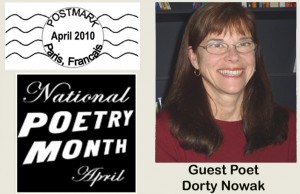 Dorty Nowak is a writer and artist living in Paris and Berkeley who writes frequently about the challenges and delights of multi-cultural living. A former educator and insurance executive, she helped found the Oakland School for the Arts. She is currently developing a collaborative project, ”Where Do I Belong,” involving artists and poets from Europe, Australia, and the U.S.
Dorty Nowak is a writer and artist living in Paris and Berkeley who writes frequently about the challenges and delights of multi-cultural living. A former educator and insurance executive, she helped found the Oakland School for the Arts. She is currently developing a collaborative project, ”Where Do I Belong,” involving artists and poets from Europe, Australia, and the U.S.
In response to our recent ‘National Poetry Month’ post, Dorty offers a couple of her favorites by Richard Wilbur and Wallace Stevens; and, she says, “because I’ll never pass up a chance for extra credit” she gives us two of her own creations. To introduce her own poems, “Windsurfer“ and “Haiku“ (below), she writes: “Recently I have been experimenting with various poetic forms. I particularly like haiku because the form demands a deceptive simplicity. I wrote “Windsurfers” while sitting on a beach in Mexico last year watching my friends windsurf. I was captivated by their skill and beauty.” — Dorty.
Since ‘National Poetry Month’ is . . . well . . . a month long, she hopes others will take this opportunity to contribute some of their favorites.
Some of Dorty’s recent contributions to the world of ideas can also be found at the “Your Life Is A Trip” blog at: http://www.yourlifeisatrip.com/home/author/dortynowak
◊◊◊◊◊◊◊◊◊◊◊◊◊◊◊◊◊◊◊◊
Love Calls Us to the Things of This World
by Richard Wilbur
The eyes open to a cry of pulleys,
And spirited from sleep, the astounded soul
Hangs for a moment bodiless and simple
As false dawn.
Outside the open window
The morning air is all awash with angels.
Some are in bed-sheets, some are in blouses,
Some are in smocks: but truly there they are.
Now they are rising together in calm swells
Of halcyon feeling, filling whatever they wear
With the deep joy of their impersonal breathing;
Now they are flying in place, conveying
The terrible speed of their omnipresence, moving
And staying like white water; and now of a sudden
They swoon down into so rapt a quiet
That nobody seems to be there.
The soul shrinks
From all that is about to remember,
From the punctual rape of every blessed day,
And cries,
“Oh, let there be nothing on earth but laundry,
Nothing but rosy hands in the rising steam
And clear dances done in the sight of heaven.”
Yet, as the sun acknowledges
With a warm look the world’s hunks and colors,
The soul descends once more in bitter love
To accept the waking body, saying now
In a changed voice as the man yawns and rises,
“Bring them down from their ruddy gallows;
Let there be clean linen for the backs of thieves;
Let lovers go fresh and sweet to be undone,
And the heaviest nuns walk in a pure floating
Of dark habits,
keeping their difficult balance.”
The Snow Man
by Wallace Stevens
One must have a mind of winter
To regard the frost and the boughs
Of the pine-trees crusted with snow;
And have been cold a long time
To behold the junipers shagged with ice,
The spruces rough in the distant glitter
Of the January sun; and not to think
Of any misery in the sound of the wind,
In the sound of a few leaves,
Which is the sound of the land
Full of the same wind
That is blowing in the same bare place
For the listener, who listens in the snow,
And, nothing himself, beholds
Nothing that is not there and the nothing that is.
Windsurfers
by Dorty Nowak
Oil slicked bodies stretch and strain,
Hold their wings against the pull of wind.
Born from the chrysalis of board and sail,
A host of dragonflies.
Sails skim the surface of the sea,
Their colors flashing in the sun.
They swoop and flit to quilt the waves.
They seem, if only for a moment, to fly.
What grace to break the human bond,
To bend such power to their ways,
Calling on gods of wind and wave,
To transform them as they play.
Haiku
by Dorty Nowak
Irrefutable
your logic sticks like a bone
in just the wrong place
◊◊◊◊◊◊◊◊◊◊◊◊◊◊◊◊◊◊◊◊
As always, your comments are always welcome and we would still like to see more of your favorite poems in this space. There are still three full weeks left in National Poetry Month!
April Is National Poetry Month
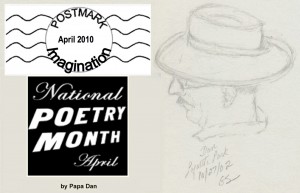 Let’s try a few
Let’s try a few
In honor of National Poetry Month, which begins next Thursday, I have assembled here a dozen of my favorites. In our culture, poetry is the neglected art form — and that’s why we need a ‘National Poetry Month.’ As you can see from my selections, “poetry” can take many forms — from the very long to the very short, from rhyming couplets to paragraphs of ‘natural’ speech, from bold optimism to its opposite. Poetry was defined by William Wordsworth as “the spontaneous overflow of powerful feelings . . . emotion recollected in tranquility.” It can be presented in many styles, from the simplest sincerity to the most cutting sarcasm; and it can address a wide range of themes. My little collection is surely not exhaustive and not even likely to yield universal agreement that it is all poetry. Not a “top-dozen” list, it is a sample of some eloquent uses of vivid, compact language, some creating distinctive characters, some expressing assertions of belief, some old friends to be re-visited, some new, all attempting to bring ideas to life with words that evoke rich images. Most are best read aloud, some with music; all are best when given a bit of time to have their way. Many of these contain a line or two — teasers, if you will — that matter very much to me — for example:
• “Try to see it, not with your eyes, for they are wise . . . ”
• “Sweet time unafflicted”
• “And that has made all the difference”
• “At a place that chose them”
• “You know how it is with an April day . . .”
• “My object in living is . . . ”
• “And smale fowles maken melodye”
• “(a leaf falls)”
• “Waiting to be named . . . THE GREAT HAJI”
• “In another world, someone over there is . . . ”
• “When you have prayed for victory, you have prayed for many unmentioned results . . . ”
• “Yes, we can ”
• “We ain’t what we was.”
Your comments about any of the following ‘poems’ are welcome. If you are interested, please share with us one or more of YOUR favorite poems. If you write one of your own, you get ‘extra credit!’
===========================
A Perfect Time To Be In Love
By Tom Jones
You wonder how these things begin.
Well, this begins with a glen.
It begins with a season, which,
For want of a better word,
We might as well call September.
It begins with a forest,
Where the woodchucks woo,
And leaves wax green,
And vines entwine like lovers.
Try to see it, not with your eyes
for they are wise;
But see it with your ears:
The cool green breathing of the leaves;
And hear it with the inside of your hand:
The soundless sound of shadows flicking light.
Celebrate sensation!
Recall that secret place,
You’ve been there, you remember,
That special place where once,
Just once, in your crowded sunlit lifetime
You hid away in shadows from the tyranny of time.
That spot beside the clover,
Where someone’s hand held your hand,
Where love was sweeter than the berries
Or the honey
Or the stinging taste of mint.
It is September, before a rain fall
A perfect time to be in love . . .”
===========================
ABC
by Robert Pinsky
Any Body Can Die, Evidently. Few
Go Happily, Irradiating Joy,
Knowledge, Love. Many
Need Oblivion, Painkillers,
Quickest Respite.
Sweet Time Unafflicted,
Various World:
X=Your Zenith.
===========================
The Road Not Taken
by Robert Frost
Two roads diverged in a yellow wood,
And sorry I could not travel both
And be one traveler; long I stood
And looked down one as far as I could
To where it bent in the undergrowth;
Then took the other, as just as fair,
And having perhaps the better claim,
Because it was grassy and wanted wear;
Though as for that the passing there
Had worn them really about the same.
And both that morning equally lay
In leaves no step had trodden black.
Oh, I kept the first for another day!
Yet knowing how way leads on to way,
I doubted if I should ever come back.
I shall be telling this with a sigh
Somewhere ages and ages hence:
Two roads diverged in a wood,
and I— I took the one less traveled by,
And that has made all the difference.
===========================
Two to One
by D.R. Sapone
(for the occasion of Ben and Cary’s wedding)
Two ‑
Shall grow from roots planted
far away across the world;
Shall arrive apart,
at a place that chose them;
Shall discover the beauty of the world
through the eyes of the other;
Shall decide to be known,
wherever the world takes them, as
‑ One
===========================
Two Tramps in Mud Time
By Robert Frost
Out of the mud two strangers came
And caught me splitting wood in the yard,
And one of them put me off my aim
By hailing cheerily “Hit them hard!”
I knew pretty well why he had dropped behind
And let the other go on a way.
I knew pretty well what he had in mind:
He wanted to take my job for pay.
Good blocks of oak it was I split,
As large around as the chopping block;
And every piece I squarely hit
Fell splinterless as a cloven rock.
The blows that a life of self-control
Spares to strike for the common good,
That day, giving loose to my soul,
I spent on the unimportant wood.
The sun was warm but the wind was chill.
You know how it is with an April day
When the sun is out and the wind is still,
You’re one month on in the middle of May.
But if you so much as dare to speak,
A cloud comes over the sunlit arch,
A wind comes off a frozen peak,
And you’re two months back in the middle of March.
A bluebird comes tenderly up to alight
And turns to the wind to unruffle a plume,
His song so pitched as not to excite
A single flower as yet to bloom.
It is snowing a flake; and he half knew
Winter was only playing possum.
Except in color he isn’t blue,
But he wouldn’t advise a thing to blossom.
The water for which we may have to look
In summertime with a witching wand,
In every wheelrut’s now a brook,
In every print of a hoof a pond.
Be glad of water, but don’t forget
The lurking frost in the earth beneath
That will steal forth after the sun is set
And show on the water its crystal teeth.
The time when most I loved my task
These two must make me love it more
By coming with what they came to ask.
You’d think I never had felt before
The weight of an ax-head poised aloft,
The grip of earth on outspread feet,
The life of muscles rocking soft
And smooth and moist in vernal heat.
Out of the wood two hulking tramps
(From sleeping God knows where last night,
But not long since in the lumber camps).
They thought all chopping was theirs of right.
Men of the woods and lumberjacks,
They judged me by their appropriate tool.
Except as a fellow handled an ax
They had no way of knowing a fool.
Nothing on either side was said.
They knew they had but to stay their stay
And all their logic would fill my head:
As that I had no right to play
With what was another man’s work for gain.
My right might be love but theirs was need.
And where the two exist in twain
Theirs was the better right–agreed.
But yield who will to their separation,
My object in living is to unite
My avocation and my vocation
As my two eyes make one in sight.
Only where love and need are one,
And the work is play for mortal stakes,
Is the deed ever really done
For Heaven and the future’s sakes.
===========================
“Aprille” From the General Prologue to Canterbury Tales
by Geoffrey Chaucer
[Its famous first ten lines . . . each line followed
by a pronunciation guide to the original 14th-century
‘Middle English’ — Click here and again on the sound bar to listen to it]
Whan that Aprille with his shoores soote
[Wan thot A’prill with his sure-es so-tuh]
The drought of March hath perced to the roote
[The drewgt of March hath pear-said to the row-tuh]
And bathed every vein in swich liquor
[And ba-thed every vane in sweech lee-coor]
Of which vertu engendred is the flour
[of wheech ver-too en-jen-dred is the flu-er]
When Zephyrus eek with his sweete breeth
[When Zeph-er-us ache with his sway-tuh breath]
Inspired hath in every holt and heeth
[In-spear-ed hath in every holt and heth]
The tendre croppes and the yonge sun
[The tawn-dray crop-pays and the young-gay soan]
Hath in the ram his halve cours yronne
[Hath in the rahm his hall-vey coors e-rown]
And smale fowles maken melodye
[And smal-ay foe-lays mock-en mel-oh-dee-uh]
That slepen all the night with open eye
[That slep-en all the neekdt with open ee-ah]
===========================
l(ale
============================
(A Footnote) From Lake Wobegon Days
by Garrison Keillor
To his parents: ‘Things you taught me’
For fear of what it might do to me, you never paid me a compliment,
and when other people did, you beat it away from me with a stick.
“He certainly is looking nice and grown up.”
You would reply: “He’d look a lot nicer if he did something about his skin.”
“That’s wonderful that he got a job.”
“Yeah, well, we’ll see how long it lasts.”
You trained me so well, I now perform this service for myself.
I deflect every kind word directed to me, and my denials
are much more extravagant than the praise.
“Good speech.”
“Oh it was way too long, I didn’t know what I was talking about,
I was just blathering on and on, I was glad when it was over.”
I do this under the impression that it is humility, a becoming quality in a person.
Actually, I am starved for a good word, but after the long drought of my youth, no word is quite good enough.
[Voice rising] “Good” isn’t enough. Under this thin veneer of modesty lies a MONSTER of greed.
I drive away faint praise, beating my little chest, waiting to be named
[Shouting now] SUN-GOD, KING OF AMERICA, IDOL OF MILLIONS, BRINGER OF FIRE,
THE GREAT HAJI, THUND-DAR THE BOY GIANT.
I don’t want to say, “Thanks, glad you liked it.” I want to say:
“RISE MY PEOPLE. REMOVE YOUR FACES FROM THE CARPET STAND, AND LOOK ME IN THE FACE!”
===========================
Golden Earth Girl
by Paul McCartney
Golden earth girl, female animal,
sings to the wind, resting at sunset,
in a mossy nest, sensing moonlight in the air,
moonlight in the air.
Good clear water, friend of wilderness
sees in the pool her own reflection.
In another world
someone over there is counting
fish in a sunbeam,
in eggshell seas.
fish in a sunbeam,
eggshell finish.
Natures lover climbs the primrose hill,
smiles at the sky, watching the sunset,
from a mossy nest.
As she falls asleep she’s counting
Fish in a sunbeam,
in eggshell seas.
fish in a sunbeam,
eggshell finish.
===========================
The War Prayer
by Mark Twain
It was a time of great and exalting excitement. The country was up in arms, the war was on, in every breast burned the holy fire of patriotism; the drums were beating, the bands playing, the toy pistols popping, the bunched fire-crackers hissing and spluttering; on every hand and far down the receding and fading spread of roofs and balconies, a fluttering wilderness of flags flashed in the sun; daily the young volunteers marched down the wide avenue gay and fine in their new uniforms, the proud fathers and mothers and sisters and sweethearts cheering them with voices choked with happy emotion as they swung by; nightly the packed mass meetings listened, panting, to patriot oratory which stirred the deepest deeps of their hearts and which they interrupted at briefest intervals with cyclones of applause, the tears running down their cheeks the while; in the churches the pastors preached devotion to flag and country and invoked the God of Battles, beseeching His aid in our good cause in outpouring of fervid eloquence which moved every listener.
It was indeed a glad and gracious time, and the half dozen rash spirits that ventured to disapprove of the war and cast a doubt upon its righteousness straightway got such a stern and angry warning that for their personal safety’s sake they quickly shrank out of sight and offended no more in that way.
Sunday morning came–next day the battalions would leave for the front; the church was filled; the volunteers were there, their young faces alight with martial dreams–visions of the stern advance, the gathering momentum, the rushing charge, the flashing sabers, the flight of the foe, the tumult, the enveloping smoke, the fierce pursuit, the surrender!
Then home from the war, bronzed heroes, welcomed, adored, submerged in golden seas of glory! With the volunteers sat their dear ones, proud, happy, and envied by the neighbors and friends who had no sons and brothers to send forth to the field of honor, there to win for the flag, or, falling, to die the noblest of noble deaths. The service proceeded; a war chapter from the Old Testament was read; the first prayer was said; it was followed by an organ burst that shook the building, and with one impulse the house rose, with glowing eyes and beating hearts, and poured out that tremendous invocation:
“God the all-terrible! Thou who ordainest,
Thunder thy clarion and lightning thy sword.”
Then came the “long” prayer. None could remember the like of it for passionate pleading and moving and beautiful language. The burden of its supplication was that an ever-merciful and begnignant Father of us all would watch over our noble young soldiers, and aid, comfort and encourage them in their patriotic work; bless them; shield them in the day of battle and the hour of peril, bear them in His mighty hand, make them strong and confident, invincible in the bloody onset; help them to crush the foe, grant to them and to their flag and country imperishable honor and glory–
An aged stranger entered and moved with slow and noiseless step up the main aisle, his eyes fixed upon the minister, his long body clothed in a robe that reached to his feet, his head bare, his white hair descending in a frothy cataract to his shoulders, his seamy face unnaturally pale, pale even to ghastliness. With all eyes following him and wondering, he made his silent way; without pausing he ascended to the preacher’s side and stood there waiting. With shut lids the preacher, unconscious of his presence, continued his moving prayer, and at last finished it with the words uttered in fervent appeal, “Bless our arms, grant us the victory, O Lord our God, Father and Protector of our land and flag!”
The stranger touched his arm, motioned him to step aside–which the startled minister did–and took his place. During some moments he surveyed the spellbound audience with solemn eyes, in which burned an uncanny light; then in a deep voice he said:
“I come from the Throne — bearing a message from Almighty God.” The words smote the house with a shock; if the stranger perceived it he gave no attention. “He has heard the prayer of His servant your shepherd, and will grant it if such be your desire after I, His messenger, shall have explained to you its import – -that is to say, its full import. For it is like unto many of the prayers of men, in that it asks for more than he who utters it is aware of–unless he pause and think. God’s servant and yours has prayed his prayer. Has he paused and taken thought? Is it one prayer? No, it is two–one uttered, the other not. Both have reached the ear of Him who heareth all supplications, the spoken and the unspoken. Ponder this — keep it in mind. If you would beseech a blessing upon yourself, beware! Lest without intent you invoke a curse upon a neighbor at the same time. If you pray for the blessing of rain upon your crop which needs it, by that act you are possibly praying for a curse upon some neighbor’s crop which may not need rain and can be injured by it.
“You have heard your servant’s prayer–the uttered part of it. I am commissioned of God to put into words the other part of it — that part which the pastor — and also in your hearts–fervently prayed silently. And ignorantly and unthinkingly? God grant that it was so! You have heard those words ‘Grant us the victory, O Lord our God.’ That is sufficient. The whole of the uttered prayer is compact into those pregnant words. Elaborations were not necessary. When you have prayed for victory, you have prayed for many unmentioned results which follow victory — must follow it, cannot help but follow it. Upon the listening spirit of God the Father fell also the unspoken part of the prayer. He commandeth me to put it into words. Listen!
“O Lord our Father, our young patriots, idols of our hearts, go forth to battle — be Thou near them! With them, in spirit, we also go forth from the sweet peace of our beloved firesides to smite the foe. O Lord our God, help us to tear their soldiers to bloody shreds with our shells; help us to cover their smiling fields with the pale forms of the patriot dead; help us to drown the thunder of their guns with the shrieks of their wounded, writhing in pain; help us to lay waste their humble homes with a hurricane of fire; help us to wring the hearts of their offending widows with unavailing grief; help us to turn them out roofless with their little children to wander unfriended the wastes of their desolated land in rags and hunger and thirst, sports of the sun flames of summer and the icy winds of winter, broken in spirit, worn with travail, imploring Thee for the refuge of the grave and denied it —
“For our sakes who adore thee, Lord, blast their hopes, blight their lives, protract their bitter pilgrimage, make heavy their steps, water their way with their tears, stain the white snow with the blood of their wounded feet!
“We ask it, in the spirit of love, of Him who is the Source of Love, and Who is the Ever-Faithful Refuge and Friends of all who are sore beset and seeking His aid with humble and contrite hearts. Amen.”
(The old man paused). “Ye have prayed it; if you still desire it, speak! The messenger of the Most High awaits.”
* * * * *
It was believed afterward that the man was a lunatic, because there was no sense in what he said.
— Mark Twain
===========================
Yes, We Can
By Barack Obama, others
It was a creed written into the founding documents that declared the destiny of a nation:
Yes, we can.
It was whispered by slaves and abolitionists
as they blazed a trail towards freedom through the darkest of nights:
Yes, we can.
It was sung by immigrants as they struck out from distant shores
and pioneers who pushed westward against an unforgiving wilderness:
Yes, we can.
It was the call of workers who organized,
women who reached for the ballot,
a president who chose the moon as our new frontier,
and a king who took us to the mountaintop
and pointed the way to the promised land:
Yes, we can, to justice and equality;
Yes, we can, to opportunity and prosperity;
Yes, we can heal this nation;
Yes, we can repair this world.
Yes, we can.
===========================
Prayer of a Former Slave
Lord, we ain’t what we want to be;
We ain’t what we ought to be;
We ain’t what we gonna be;
But thank God almighty, we ain’t what we was.
===========================


